2014年重庆市专升本《大学英语》考试大纲
2014年专升本《英语听力》考试大纲
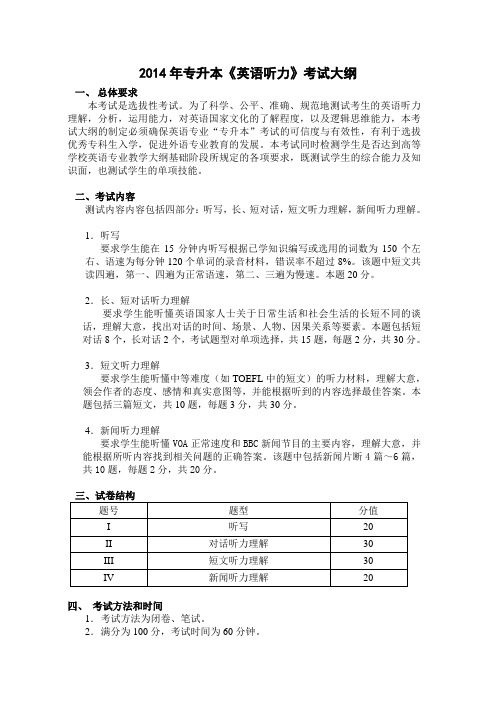
2014年专升本《英语听力》考试大纲一、总体要求本考试是选拔性考试。
为了科学、公平、准确、规范地测试考生的英语听力理解,分析,运用能力,对英语国家文化的了解程度,以及逻辑思维能力,本考试大纲的制定必须确保英语专业“专升本”考试的可信度与有效性,有利于选拔优秀专科生入学,促进外语专业教育的发展。
本考试同时检测学生是否达到高等学校英语专业教学大纲基础阶段所规定的各项要求,既测试学生的综合能力及知识面,也测试学生的单项技能。
二、考试内容测试内容内容包括四部分:听写,长、短对话,短文听力理解,新闻听力理解。
1.听写要求学生能在15分钟内听写根据已学知识编写或选用的词数为150个左右、语速为每分钟120个单词的录音材料,错误率不超过8%。
该题中短文共读四遍,第一、四遍为正常语速,第二、三遍为慢速。
本题20分。
2.长、短对话听力理解要求学生能听懂英语国家人士关于日常生活和社会生活的长短不同的谈话,理解大意,找出对话的时间、场景、人物、因果关系等要素。
本题包括短对话8个,长对话2个,考试题型对单项选择,共15题,每题2分,共30分。
3.短文听力理解要求学生能听懂中等难度(如TOEFL中的短文)的听力材料,理解大意,领会作者的态度、感情和真实意图等,并能根据听到的内容选择最佳答案。
本题包括三篇短文,共10题,每题3分,共30分。
4.新闻听力理解要求学生能听懂VOA正常速度和BBC新闻节目的主要内容,理解大意,并能根据所听内容找到相关问题的正确答案。
该题中包括新闻片断4篇~6篇,共10题,每题2分,共20分。
四、考试方法和时间1.考试方法为闭卷、笔试。
2.满分为100分,考试时间为60分钟。
2014专接本考试大纲

2014专接本考试大纲2014年专接本考试大纲主要针对的是专科生升本科的考试,它涵盖了考试的科目、内容、形式和要求等方面。
以下是2014年专接本考试大纲的详细内容:一、考试科目2014年专接本考试的科目一般包括:1. 语文:考查学生的阅读理解能力、写作能力和语言运用能力。
2. 数学:分为高等数学和线性代数两部分,考查学生的数学基础和逻辑思维能力。
3. 英语:考查学生的英语听说读写能力,包括词汇、语法、阅读和写作。
4. 专业课:根据不同的专业方向,考查学生的专业基础知识和应用能力。
二、考试内容1. 语文:包括现代文阅读、文言文阅读、写作等部分。
现代文阅读主要考查学生对文章的理解、分析和评价能力;文言文阅读则考查学生对古文的翻译和理解能力;写作部分则考查学生的表达和写作能力。
2. 数学:高等数学部分包括微积分、线性代数、概率论与数理统计等内容;线性代数部分则主要考查矩阵运算、向量空间等基础知识。
3. 英语:包括听力、阅读、完形填空、翻译和写作等部分。
听力部分考查学生的英语听力理解能力;阅读部分考查学生的快速阅读和信息提取能力;完形填空考查学生的语境分析和词汇运用能力;翻译部分考查学生的英汉互译能力;写作部分考查学生的英语写作能力。
4. 专业课:根据专业不同,考试内容也有所不同。
一般包括专业基础知识、专业技能和案例分析等。
三、考试形式1. 笔试:大部分科目采用闭卷笔试的形式进行,要求学生在规定时间内完成试题。
2. 口试:部分科目如英语口语,可能采用口试的形式进行,考查学生的口语表达能力。
3. 实践操作:对于某些专业课程,可能需要进行实践操作考试,考查学生的实际操作能力。
四、考试要求1. 掌握基础知识:考生需要对所学专业的基础知识有深入的了解和掌握。
2. 具备分析和解决问题的能力:考生应具备分析问题和解决问题的能力,能够在考试中灵活运用所学知识。
3. 注重实践应用:考生应注重将理论知识与实践相结合,提高自身的实践操作能力。
2014年普通高等学校招生全国统一考试英语大纲的说明
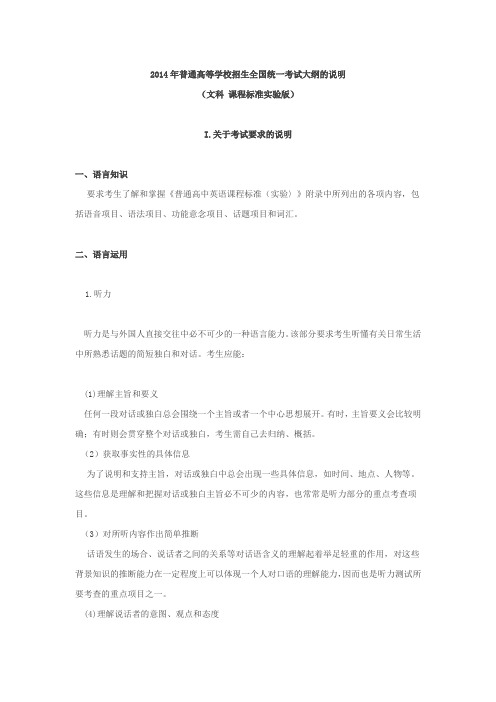
2014年普通高等学校招生全国统一考试大纲的说明(文科课程标准实验版)I.关于考试要求的说明一、语言知识要求考生了解和掌握《普通高中英语课程标准(实验〉》附录中所列出的各项内容,包括语音项目、语法项目、功能意念项目、话题项目和词汇。
二、语言运用1.听力听力是与外国人直接交往中必不可少的一种语言能力。
该部分要求考生听懂有关日常生活中所熟悉话题的简短独白和对话。
考生应能:(1)理解主旨和要义任何一段对话或独白总会围绕一个主旨或者一个中心思想展开。
有时,主旨要义会比较明确;有时则会贯穿整个对话或独白,考生需自己去归纳、概括。
(2)获取事实性的具体信息为了说明和支持主旨,对话或独白中总会出现一些具体信息,如时间、地点、人物等。
这些信息是理解和把握对话或独白主旨必不可少的内容,也常常是听力部分的重点考查项目。
(3)对所听内容作出简单推断话语发生的场合、说话者之间的关系等对话语含义的理解起着举足轻重的作用,对这些背景知识的推断能力在一定程度上可以体现一个人对口语的理解能力,因而也是听力测试所要考查的重点项目之一。
(4)理解说话者的意图、观点和态度一般来讲,说话者总会有说话的意图,或是提出或回答问题,阐述自己的想法,或是表明自己的态度或意见,对此的理解或推断在一般交往中非常重要。
有时,说话者的意图或观点是明说出来的,有时则隐含在对话的字里行间,需要听者自己去揣摩、推断。
2. 阅读理解阅读文章是我国考生接触外语的最主要途径,因此,阅读理解在试卷中占权重较大。
该部分要求考生读懂熟悉的有关日常生活话题的简短文字材料,例如公告、说明、广告以及书、报、杂志中关于一般性话题的简短文章。
考生应能:(1)理解主旨和要义任何一篇文章都会有一个主旨要义。
有时从文章的第一个段落,甚至第一个句子即可得出文章的主旨要义,从这一段或这个句子读者会知道文章描述的是谁或什么(即文章的主题),亦会了解作者希望读者了解主题方面的哪些内容。
有时,文章的主旨要义则需从文章的字里行间进行推断。
2014年专升本英语试题及答案
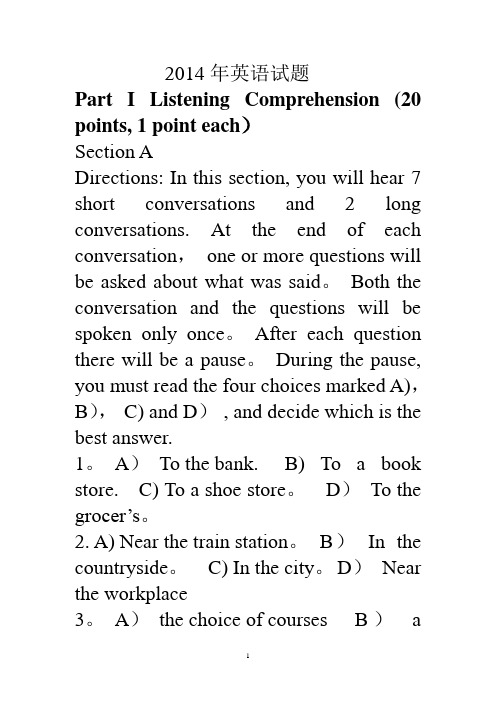
2014年英语试题Part I Listening Comprehension (20 points, 1 point each)Section ADirections: In this section, you will hear 7 short conversations and 2 long conversations. At the end of each conversation,one or more questions will be asked about what was said。
Both the conversation and the questions will be spoken only once。
After each question there will be a pause。
During the pause, you must read the four choices marked A),B),C) and D), and decide which is the best answer.1。
A)To the bank. B) To a book store. C) To a shoe store。
D)To the grocer’s。
2. A) Near the train station。
B)In the countryside。
C) In the city。
D)Near the workplace3。
A)the choice of courses B) aday course C) an evening course D) their work4. A) The pear. B)The weather。
C)The sea food. D) The cold。
5。
A) George’s wife.B) George’s father.C) George's brother D) George’s wife’s father.6。
重庆大学2014硕士生英语复习大纲(B类)
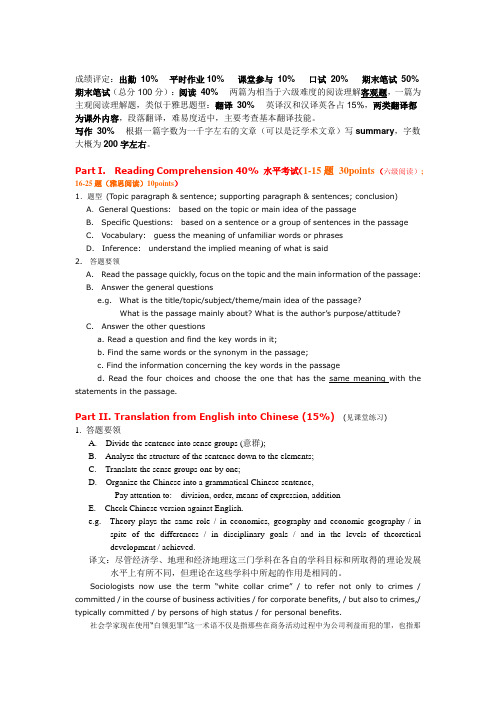
成绩评定:出勤10% 平时作业10% 课堂参与10% 口试20% 期末笔试50%期末笔试(总分100分):阅读40% 两篇为相当于六级难度的阅读理解客观题,一篇为主观阅读理解题,类似于雅思题型:翻译30%英译汉和汉译英各占15%,两类翻译都为课外内容,段落翻译,难易度适中,主要考查基本翻译技能。
写作30% 根据一篇字数为一千字左右的文章(可以是泛学术文章)写summary,字数大概为200字左右。
Part I. Reading Comprehension 40% 水平考试(1-15题30points (六级阅读); 16-25题(雅思阅读)10points)1.题型(Topic paragraph & sentence; supporting paragraph & sentences; conclusion) A.General Questions: based on the topic or main idea of the passageB. Specific Questions: based on a sentence or a group of sentences in the passageC. Vocabulary: guess the meaning of unfamiliar words or phrasesD. Inference: understand the implied meaning of what is said2. 答题要领A. Read the passage quickly, focus on the topic and the main information of the passage:B. Answer the general questionse.g. What is the title/topic/subject/theme/main idea of the passage?What is the passage mainly about? What is the author’s purpose/attitude?C. Answer the other questionsa. Read a question and find the key words in it;b. Find the same words or the synonym in the passage;c. Find the information concerning the key words in the passaged. Read the four choices and choose the one that has the same meaning with the statements in the passage.Part II. Translation from English into Chinese (15%) (见课堂练习)1. 答题要领A. Divide the sentence into sense groups (意群);B. Analyze the structure of the sentence down to the elements;C. Translate the sense groups one by one;D. Organize the Chinese into a grammatical Chinese sentence,Pay attention to: division, order, means of expression, additionE. Check Chinese version against English.e.g. Theory plays the same role / in economics, geography and economic geography / inspite of the differences / in disciplinary goals / and in the levels of theoreticaldevelopment / achieved.译文:尽管经济学、地理和经济地理这三门学科在各自的学科目标和所取得的理论发展水平上有所不同,但理论在这些学科中所起的作用是相同的。
2014年普通高等学校招生统一考试 大纲英语

2014年普通高等学校招生全国统一考试英语(大纲卷)英语第Ⅰ卷第一部分听力(共两节,满分30分)见江苏卷第二部分英语知识运用(共两节,满分45分)第一节单项填空(共15小题:每小题1分,满分15分)从A、B、C、D四个选项中.选出可以填入空白处的最佳选项,并在答题卡上将该项涂黑。
21. --- I’m sorry for breaking the cup.--- Oh, ____ --I’ve got plenty.A. forget itB. my pleasureC. help yourselfD. pardon me22. Unless extra money____, the theatre will close.A. was foundB. findsC. is foundD. found23. Toady there are more airplanes _____ more people than ever before in the skies.A. carryB. carryingC. carriedD. to be carrying24. Exactly ____ the potato was introduced into Europe is uncertain, but it was probably around 1565.A. whetherB. whyC. whenD. how25. --- Who’s that at the door?--- _____ is the milkman.A. HeB. ItC. ThisD. That26. _____ the nurses want a pay increase, they want reduced hours as well.A. Not do onlyB. Do not onlyC. Only not doD. Not only do27. Raymond’s parents wanted him to have ______ possible education.A. goodB. betterC. bestD. the best28. I think Mrs. Stark could be ______ between 50 and 60 years of age.A. anywhereB. anybodyC. anyhowD. anything29. September 30 is the day ______ which you must pay your bill.A. byB. forC. withD. in30. Although you _____ find bargains in London, it’s not generally a cheap place to shop.A. shouldB. needC. mustD. can31. Caroline doesn’t have a gift for music, but she _____ it with hard work.A. goes back onB. takes away fromC. makes up forD. catches up with32. The reports went missing in 2012 and nobody ______ them since.A. seesB. sawC. has seenD. had seen33. _____ me tomorrow and I’ll let you know the lab result.A. CallingB. CallC. To callD. Having called34. Henry was away from home for quiet a bit and _____ saw his family.A. frequentlyB. seldomC. alwaysD. usually35. --- What did you do last weekend?--- Nothing _____.A. muchB. elseC. everD. yet第二节完形填空(共20小题;每小题1.5分,满分30分)阅读下面短文.从短文后各题所给的四个选项(A、B. C和D )中,选出可以填入空白处的最佳选项,并在答题卡上将该项小涂黑。
考试大纲
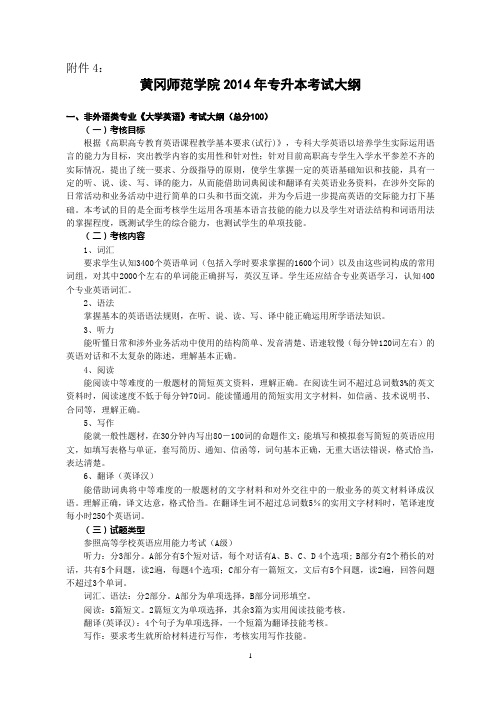
附件4:黄冈师范学院2014年专升本考试大纲一、非外语类专业《大学英语》考试大纲(总分100)(一)考核目标根据《高职高专教育英语课程教学基本要求(试行)》,专科大学英语以培养学生实际运用语言的能力为目标,突出教学内容的实用性和针对性;针对目前高职高专学生入学水平参差不齐的实际情况,提出了统一要求、分级指导的原则,使学生掌握一定的英语基础知识和技能,具有一定的听、说、读、写、译的能力,从而能借助词典阅读和翻译有关英语业务资料,在涉外交际的日常活动和业务活动中进行简单的口头和书面交流,并为今后进一步提高英语的交际能力打下基础。
本考试的目的是全面考核学生运用各项基本语言技能的能力以及学生对语法结构和词语用法的掌握程度,既测试学生的综合能力,也测试学生的单项技能。
(二)考核内容1、词汇要求学生认知3400个英语单词(包括入学时要求掌握的1600个词)以及由这些词构成的常用词组,对其中2000个左右的单词能正确拼写,英汉互译。
学生还应结合专业英语学习,认知400个专业英语词汇。
2、语法掌握基本的英语语法规则,在听、说、读、写、译中能正确运用所学语法知识。
3、听力能听懂日常和涉外业务活动中使用的结构简单、发音清楚、语速较慢(每分钟120词左右)的英语对话和不太复杂的陈述,理解基本正确。
4、阅读能阅读中等难度的一般题材的简短英文资料,理解正确。
在阅读生词不超过总词数3%的英文资料时,阅读速度不低于每分钟70词。
能读懂通用的简短实用文字材料,如信函、技术说明书、合同等,理解正确。
5、写作能就一般性题材,在30分钟内写出80-100词的命题作文;能填写和模拟套写简短的英语应用文,如填写表格与单证,套写简历、通知、信函等,词句基本正确,无重大语法错误,格式恰当,表达清楚。
6、翻译(英译汉)能借助词典将中等难度的一般题材的文字材料和对外交往中的一般业务的英文材料译成汉语。
理解正确,译文达意,格式恰当。
在翻译生词不超过总词数5%的实用文字材料时,笔译速度每小时250个英语词。
2014年版 专升本 英语复习题及答案
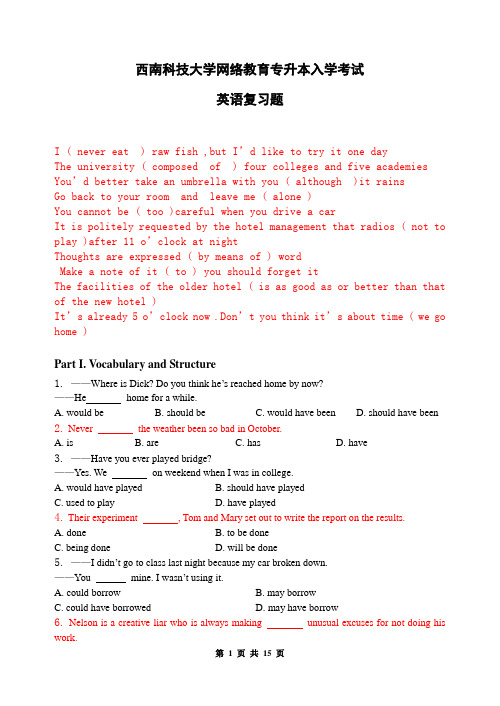
西南科技大学网络教育专升本入学考试英语复习题I ( never eat ) raw fish ,but I’d like to try it one dayThe university ( composed of ) four colleges and five academies You’d better take an umbrella with you ( although )it rainsGo back to your room and leave me ( alone )You cannot be ( too )careful when you drive a carIt is politely requested by the hotel management that radios ( not to play )after 11 o’clock at nightThoughts are expressed ( by means of ) wordMake a note of it ( to ) you should forget itThe facilities of the older hotel ( is as good as or better than that of the new hotel )It’s already 5 o’clock now .Don’t you think it’s about time ( we go home )Part I. Vocabulary and Structure1.——Where is Dick? Do you think he’s reached home by now?——He home for a while.A. would beB. should beC. would have beenD. should have been2. Never the weather been so bad in October.A. isB. areC. hasD. have3.——Have you ever played bridge?——Yes. We on weekend when I was in college.A. would have playedB. should have playedC. used to playD. have played4. Their experiment , Tom and Mary set out to write the report on the results.A. doneB. to be doneC. being doneD. will be done5.——I did n’t go to class last night because my car broken down.——You mine. I wasn’t using it.A. could borrowB. may borrowC. could have borrowedD. may have borrow6. Nelson is a creative liar who is always making unusual excuses for not doing his work.A. acrossB. awayC. offD. up7. Since you feel so strongly about this matter, you should make your views to other committee members.A. knowB. knowingC. being knownD. known8. He is not a stranger for me. I have met him on several .A. situationsB. environmentsC. occasionsD. positions9. This disease is second only heart attack as a cause of death all over the world.A. toB. ofC. withD. from10.——I’m afraid I have to go now, Jim.——I’d rather you go alone. I t’s already too late.A. don’tB. didn’tC. wouldn’tD. shouldn’t11. This is for ten of us to sit at. Please get us a larger one.A. too small a tableB. a too small tableC. a such small tableD. such small a table12. If you’re looking for a fully-furnished room to rent, I think there’s a(n) apartment in my building.A. emptyB. bareC. vacantD. free13. The manager promised to keep me how our business was going on.A. informingB. informedC. to informD. to be informed14. The boys spent the whole morning possible answers to the question.A. discussB. to discussC. discussingD. discussed15.More and more families have moved elsewhere because they cannot the noise from the neighboring airport.A. come up withB. put up withC. catch up withD. keep up with16.The traditional approach ________ with complex problem is to break them down into smaller, more easily managed problems.A. to dealingB. in dealingC. dealingD. to deal17. We forget to bring our tickets, but please let us enter,______?A. do youB. will youC. can weD. shall we18.Shelly had prepared carefully for her biology examination so that she could be sure of passing it on her first ______.A. intentionB. attemptC. purposeD. desire19. The ancient Egyptians are supposed _______ rockets to the moon.A. to sendB. to be sendingC. to have sentD. to have been sending20. ______you eat the correct foods ______ be able to keep fit and stay healthy.A. Only if; you willB. Only if; will youC. Unless; you willD. Unless; will you21. Staying in a hotel costs ______ renting a room in a dormitory for a week.A. twice moreB. twice as much asC. as much twice asD. as much as twice22. The little girl could not _____ the attraction of the piece of the chocolate.A. consistB. persistC. insistD. resist23. She was so ____ in her job that she didn’t hear anybody knocking at the door.A. attractedB. absorbedC. drawnD. concentrated24. Many children, _____ parents are away working in big cities, are taken good care of in the village.A. of themB. whoseC. theirD. with whom25. He _____ at the boy into silence.A. glancedB. observedC. watchedD. almost26. It is kind ______ you to do me a favor at this moment.A. toB. forC. ofD. about27. You cannot see the patient at the moment; he is now _______ medical treatment.A. inB. onC. underD. at28. He promised that he would _____ to get us two tickets of the soccer game.A. manageB. fulfillC. accomplishD. succeed29. He got a job with the corporation in 2000 and has worked there ______.A. sinceB. ever sinceC. ever beforeD. till then30. My mobile phone isn’t in my bag. Where ______ I have put it ?A. canB. mustC. shouldD. would31. Mr.Verder never thought that he would become a member of the board of directors because of his _____ origin.A. humbleB. previousC. criticalD. false32. It’s bad policy for developing countries to sacrifice environmental protection to ________ economic growth.A. discourageB. weakenC. promoteD. create33. He did it _____ gratitude for everything she had done for him.A. withB. inC. with regard toD. out of34. The ship ______ form behind the fog.A. droveB. emergedC. passedD. turned35.I’d rather marry a man who had a(n) _______ of humor than one who was very attractive.A. capabilityB. sightC. knowledgeD. sense36. We’ll visit Europe next year _______ we have enough money.A. lestB. untilC. unlessD. provided37.I’m sorry I can’t see you immediately; but if you’d like to take a seat, I’ll be with you ______ .A. for a momentB. in a momentC. for the momentD. at the moment38. We love peace, yet we are not the kind of people to yield ______ any military threat.A. upB. toC. inD. at39. The internet users visiting our website are _______ young people between the age of 13 and20.A. mostB. almostC. mostlyD. at most40.There are several means of mass communication. The newspaper is one .Television is _______.A. the otherB. the anotherC. otherD. another41. We had borrowed two VCDs but didn’t have time to watch ______ of them.A. someB. eitherC. allD. neither42. Would you please let me finish my words? Don’t ______ in the middle of a sentence.A. put me offB. cut me offC. keep me offD. get me off43. In the first semester, I asked my teacher _______.A. what courses should I takeB. what courses I should takeC. I should take what coursesD. should I take what courses44. There aren’t many wild pandas ______ in the world today.A. liveB. livingC. to liveD. lived45. Don’t ask him how old he is-he’s really _______ about it.A. sensitiveB. carelessC. cautiousD. anxiousPart II. Writing46. Directions: For this part, you are supposed to write a composition in English in 100-120 words based on the following information. Remember to write it clearly.以“Failure and Success”为题写一篇短文,内容包括:(1)人生遭遇失败很常见;(2)每个人都渴望成功;(3)失败走向成功的必经之路。
2014年专升本考试科目
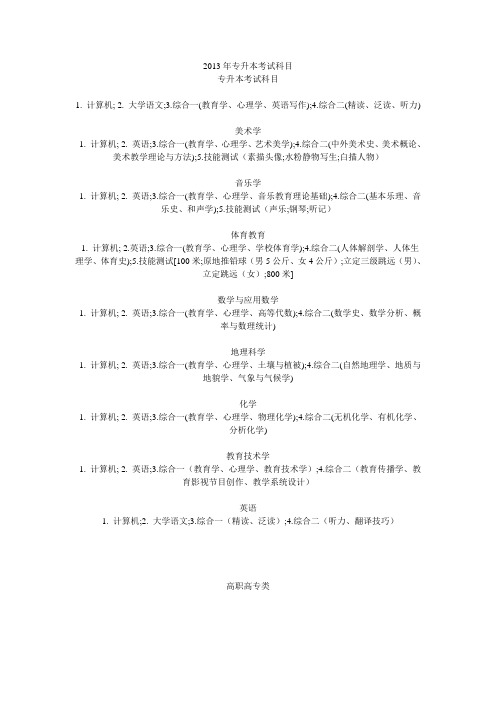
2013年专升本考试科目专升本考试科目1. 计算机;2. 大学语文;3.综合一(教育学、心理学、英语写作);4.综合二(精读、泛读、听力)美术学1. 计算机;2. 英语;3.综合一(教育学、心理学、艺术美学);4.综合二(中外美术史、美术概论、美术教学理论与方法);5.技能测试(素描头像;水粉静物写生;白描人物)音乐学1. 计算机;2. 英语;3.综合一(教育学、心理学、音乐教育理论基础);4.综合二(基本乐理、音乐史、和声学);5.技能测试(声乐;钢琴;听记)体育教育1. 计算机;2.英语;3.综合一(教育学、心理学、学校体育学);4.综合二(人体解剖学、人体生理学、体育史);5.技能测试[100米;原地推铅球(男5公斤、女4公斤);立定三级跳远(男)、立定跳远(女);800米]数学与应用数学1. 计算机;2. 英语;3.综合一(教育学、心理学、高等代数);4.综合二(数学史、数学分析、概率与数理统计)地理科学1. 计算机;2. 英语;3.综合一(教育学、心理学、土壤与植被);4.综合二(自然地理学、地质与地貌学、气象与气候学)化学1. 计算机;2. 英语;3.综合一(教育学、心理学、物理化学);4.综合二(无机化学、有机化学、分析化学)教育技术学1. 计算机;2. 英语;3.综合一(教育学、心理学、教育技术学);4.综合二(教育传播学、教育影视节目创作、教学系统设计)英语1. 计算机;2. 大学语文;3.综合一(精读、泛读);4.综合二(听力、翻译技巧)高职高专类考试科目及范围英语1. 计算机;2. 大学语文;3.综合一(精读、泛读);4.综合二(听力、翻译技巧)朝鲜语1. 计算机;2. 大学语文;3.综合一(精读、泛读);4.综合二(听力、翻译技巧)日语1. 计算机;2. 大学语文;3.综合一(基础日语、日本概况);4.综合二(听力、会话)艺术设计1. 计算机;2. 英语;3.综合一(素描);4.综合二(命题设计)园艺1. 计算机;2. 英语;3.综合一(植物生理、土壤与植物营养);4.综合二(园艺植物栽培学、遗传学)国际经济与贸易1. 计算机;2. 英语;3.综合一(高等数学、会计学);4.综合二(国际贸易理论与实务、市场营销学)金融学1. 计算机;2. 英语;3.综合一(西方经济学、货币银行学);4.综合二(会计学、保险学原理)会计学1. 计算机;2. 英语;3.综合一(高等数学、基础会计);4.综合二(财务会计、审计基础与实务)电子商务1. 计算机;2. 英语;3.综合一(高等数学、经济法);4.综合二(网络营销、国际商务)市场营销1. 计算机;2. 英语;3.综合一(经济法、基础会计);4.综合二(市场营销学、市场调查与预测)公共事业管理1. 计算机;2. 英语;3.综合一(管理学原理、管理心理学);4.综合二(人力资源开发与管理、公共关系学)工商管理1. 计算机;2. 英语;3.综合一(经济数学、管理学基础);4.综合二(经济法、基础会计)1. 计算机;2. 英语;3.综合一(旅游概论、旅游心理学);4.综合二(旅游市场营销、旅游资源与开发)法学1. 计算机;2. 英语;3.综合一(法理学、宪法);4.综合二(民法、刑法、经济法)生物科学1. 计算机;2. 英语;3.综合一(无机化学、遗传学);4.综合二(动物学、植物学)电气工程及其自动化1. 计算机;2. 英语;3.综合一(高等数学、自控理论);4.综合二(电路、电子技术[数字、模拟电路])电子信息工程1. 计算机;2. 英语;3.综合一(高等数学、信息理论与编码);4.综合二(数字信号、自控原理)服装设计与工程1. 计算机;2. 英语;3.综合一(服装设计、服装材料);4.综合二(服装史、美学)工程管理1. 计算机;2. 英语;3.综合一(管理学、会计学);4.综合二(建筑材料、招投标与合同管理)化学工程与工艺1. 计算机;2. 英语;3.综合一(有机化学、无机化学);4.综合二(分析化学、化工原理)机械设计制造及其自动化1. 计算机;2. 英语;3.综合一(高等数学、工程力学);4.综合二(电工学、机械设计基础)交通运输1. 计算机;2. 英语;3.综合一(高等数学、理论力学);4.综合二(汽车理论、汽车构造)计算机科学与技术1. 高等数学;2. 英语;3.综合一(操作系统原理、微机原理与接口技术);4.综合二(数据结构、C语言)土木工程1. 计算机;2. 英语;3.综合一(高等数学、混凝土结构);4.综合二(材料力学、结构力学)口腔医学1. 计算机;2. 英语;3.综合一(口腔组织病理学、口腔解剖生理学);4.综合二(口腔内科学、口腔颌面外科学、口腔修复学)1. 计算机;2. 英语;3.综合一(生物化学、病理解剖);4.综合二(内科学、外科学)护理学1. 计算机;2. 英语;3.综合一(生理学、护理学基础);4.综合二(内科护理学、外科护理学)麻醉学1. 计算机;2. 英语;3.综合一(生理学、人体解剖学、麻醉解剖学);4.综合二(外科学、临床麻醉学、重症监测)药学1. 计算机;2. 英语;3.综合一(药物化学、微生物学);4.综合二(有机化学、药物分析)医学检验1. 计算机;2. 英语;3.综合一(临床检验基础、生物化学检验);4.综合二(微生物学检验、免疫学检验)医学影像学1. 计算机;2. 英语;3.综合一(生理学、影像电子学基础);4.综合二(医学影像诊断学、医学影像设备学)针灸推拿学1. 计算机;2. 英语;3.综合一(中医基础理论、中药学);4.综合二(诊断学基础、针灸临床学)中药学1. 计算机;2. 英语;3.综合一(中医基础理论、中药鉴定学、药理学);4.综合二(中药炮制学、中药药剂学)中医学1. 计算机;2. 英语;3.综合一(中医基础理论、方剂学、中药学、);4.综合二(诊断学基础、中医内科学)动物医学1. 计算机;2. 英语;3.综合一(动物生理学、遗传学);4.综合二(内科学、外科学、传染病)附件3:计算机;2. 英语;3.综合一(经济数学、管理学基础);4.综合二(经济法、基础会计)旅游管理1. 计算机;2. 英语;3.综合一(旅游概论、旅游心理学);4.综合二(旅游市场营销、旅游资源与开发)法学1. 计算机;2. 英语;3.综合一(法理学、宪法);4.综合二(民法、刑法、经济法)生物科学1. 计算机;2. 英语;3.综合一(无机化学、遗传学);4.综合二(动物学、植物学)电气工程及其自动化1. 计算机;2. 英语;3.综合一(高等数学、自控理论);4.综合二(电路、电子技术[数字、模拟电路])电子信息工程1. 计算机;2. 英语;3.综合一(高等数学、信息理论与编码);4.综合二(数字信号、自控原理)服装设计与工程1. 计算机;2. 英语;3.综合一(服装设计、服装材料);4.综合二(服装史、美学)工程管理1. 计算机;2. 英语;3.综合一(管理学、会计学);4.综合二(建筑材料、招投标与合同管理)化学工程与工艺1. 计算机;2. 英语;3.综合一(有机化学、无机化学);4.综合二(分析化学、化工原理)机械设计制造及其自动化1. 计算机;2. 英语;3.综合一(高等数学、工程力学);4.综合二(电工学、机械设计基础)交通运输1. 计算机;2. 英语;3.综合一(高等数学、理论力学);4.综合二(汽车理论、汽车构造)计算机科学与技术1. 高等数学;2. 英语;3.综合一(操作系统原理、微机原理与接口技术);4.综合二(数据结构、C语言)土木工程1. 计算机;2. 英语;3.综合一(高等数学、混凝土结构);4.综合二(材料力学、结构力学)口腔医学1. 计算机;2. 英语;3.综合一(口腔组织病理学、口腔解剖生理学);4.综合二(口腔内科学、口腔颌面外科学、口腔修复学)临床医学1. 计算机;2. 英语;3.综合一(生物化学、病理解剖);4.综合二(内科学、外科学)护理学1. 计算机;2. 英语;3.综合一(生理学、护理学基础);4.综合二(内科护理学、外科护理学)麻醉学1. 计算机;2. 英语;3.综合一(生理学、人体解剖学、麻醉解剖学);4.综合二(外科学、临床麻醉学、重症监测)药学1. 计算机;2. 英语;3.综合一(药物化学、微生物学);4.综合二(有机化学、药物分析)医学检验1. 计算机;2. 英语;3.综合一(临床检验基础、生物化学检验);4.综合二(微生物学检验、免疫学检验)医学影像学1. 计算机;2. 英语;3.综合一(生理学、影像电子学基础);4.综合二(医学影像诊断学、医学影像设备学)针灸推拿学1. 计算机;2. 英语;3.综合一(中医基础理论、中药学);4.综合二(诊断学基础、针灸临床学)中药学1. 计算机;2. 英语;3.综合一(中医基础理论、中药鉴定学、药理学);4.综合二(中药炮制学、中药药剂学)中医学1. 计算机;2. 英语;3.综合一(中医基础理论、方剂学、中药学、);4.综合二(诊断学基础、中医内科学)动物医学1. 计算机;2. 英语;3.综合一(动物生理学、遗传学);4.综合二(内科学、外科学、传染病)该文章转载自无忧考网:。
2014专升本考试大纲

2014专升本考试大纲2014年的专升本考试大纲是针对那些希望从专科学历提升到本科学历的学生而设计的。
专升本考试是高等教育体系中的一个重要环节,它为专科生提供了一个继续深造的机会。
以下是2014年专升本考试大纲的主要内容:# 一、考试目的和性质专升本考试旨在测试学生是否具备进入本科阶段学习的基本能力和知识水平。
考试不仅是选拔学生的依据,也是学生自我检验学习成果的机会。
# 二、考试科目和内容专升本考试通常包括以下几个科目:1. 语文:考察学生的阅读理解能力、写作能力和语文基础知识。
2. 数学:根据专业不同,数学科目可能包括高等数学、线性代数等。
3. 英语:测试学生的英语阅读、写作、听力和翻译能力。
4. 专业课:根据学生报考的专业,考察相关的专业知识和技能。
# 三、考试形式和时间1. 笔试:大部分科目采用闭卷笔试的形式进行。
2. 口试:部分科目如英语可能会包含口试部分。
3. 实践操作:对于某些专业,如医学、工程等,可能需要进行实践操作考试。
4. 考试时间:一般安排在每年的春季,具体时间由各地教育考试院确定。
# 四、考试要求1. 知识掌握:考生需要对所学专业知识有系统的理解。
2. 应用能力:考生应能将所学知识应用于解决实际问题。
3. 创新思维:鼓励考生在答题时展现自己的创新思维和独立见解。
# 五、考试评分标准1. 客观题:选择题、判断题等,根据标准答案评分。
2. 主观题:简答题、论述题、作文等,根据内容的准确性、逻辑性和表达能力评分。
3. 实践操作:根据操作的规范性、熟练度和效果评分。
# 六、备考建议1. 系统复习:考生应系统地复习所学专业知识,查漏补缺。
2. 模拟练习:通过模拟考试来熟悉考试流程和题型。
3. 时间管理:合理分配复习和考试时间,避免临近考试时的紧张和焦虑。
4. 心理调适:保持良好的心态,增强自信心。
# 七、考试纪律1. 诚信考试:考生应遵守考试规则,诚实应考。
2. 禁止作弊:严禁任何形式的作弊行为,一经发现将受到严厉处罚。
2014年重庆市专升本考试英语模拟试题一
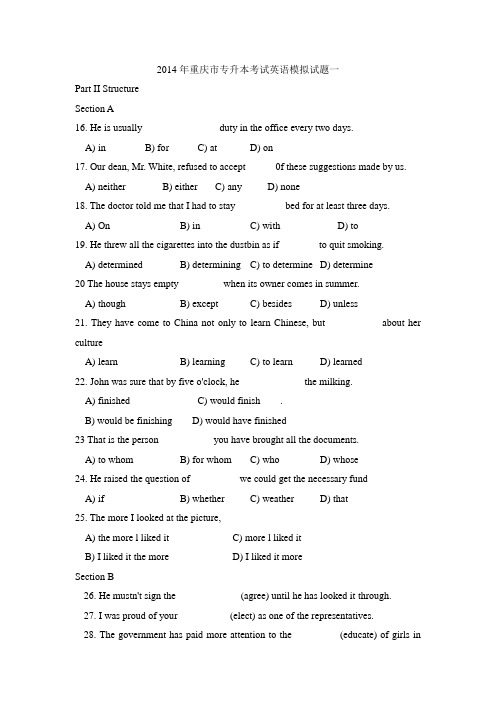
2014年重庆市专升本考试英语模拟试题一Part II StructureSection A16. He is usually _______________duty in the office every two days.A) in B) for C) at D) on17. Our dean, Mr. White, refused to accept______0f these suggestions made by us.A) neither B) either C) any D) none18. The doctor told me that I had to stay _________ bed for at least three days.A) On B) in C) with D) to19. He threw all the cigarettes into the dustbin as if _______ to quit smoking.A) determined B) determining C) to determine D) determine20 The house stays empty ________ when its owner comes in summer.A) though B) except C) besides D) unless21. They have come to China not only to learn Chinese, but __________ about her cultureA) learn B) learning C) to learn D) learned22. John was sure that by five o'clock, he ____________ the milking.A) finished C) would finish .B) would be finishing D) would have finished23 That is the person __________ you have brought all the documents.A) to whom B) for whom C) who D) whose24. He raised the question of _________ we could get the necessary fundA) if B) whether C) weather D) that25. The more I looked at the picture, ________________A) the more l liked it C) more l liked itB) I liked it the more D) I liked it moreSection B26. He mustn't sign the ____________ (agree) until he has looked it through.27. I was proud of your__________ (elect) as one of the representatives.28. The government has paid more attention to the_________ (educate) of girls inthe countryside.29. There_________ (exist) a lot of cultural differences between the east and the west.30. It's____________ (danger) for children under 12 to ride the bicycle on the road.31. We have to go to the library_________ (frequent) to search information for our term paper.32 Those foreign professors were___________ (please) with the arrangements there33. We were surprised________ (hear) that he had left school.34. I'd like to tell you that my request is that they___________ (set) free immediately35. 1 don't think it's worth___________ (take) a taxi over such a short distance. Part III Reading ComprehensionTask lIn the past, a city's major shopping district was in its downtown area. People could get downtown more easily than they could get to other parts of the City. Before the 1960s, the best way to travel in a city was on a street-car, a subway, a railroad, or an elevated train. All of these ran on tracks that led downtown.As our cities grew outward, people living far from the center of town needed a place they could drive to quickly. Driving downtown was difficulty. Finding a parking space downtown was something impossible People also needed a shopping place where they could park easily.To meet the shopping needs of people living in the suburbs, groups of businesses moved farther out, too. Today most suburbs have large shopping centers.Modern and well-planned shopping centers are built on large areas of ground. They have even more space for parking than they do for stores. The shopping centers have many different kinds of stores. Often, the shoppers can do all their shopping in one place.The very large shopping centers have malls which make shopping pleasant. The mall is an area between stores set aside for walking. Shoppers can stroll from store to store and enjoy beautiful fountains, statues, and plants. There are benches so thatshoppers may rest. Some shopping centers have malls with roofs that protect shoppers from the weather outside.36. The first paragraph tells us that in the pastA) few people drove cars to do shoppingB) it was convenient to do shopping downtownC) people liked to live in downtown areasD) street-cars were the main vehicle within a city37. Why did some businesses move from downtown to the suburbs?A) They needed more space to build modem large stores.B) People did not like to do shopping in city centers.C) Shopping downtown was difficult due to heavy traffic.D) Downtown businesses were not as good as before38. Nowadays people prefer to go shopping in big mails because. Malls ___A) are much closer to their homesB) have much larger walking spaceC) can shelter people from sunshineD) are more pleasant for shoppers.39. The passage is mainly aboutA) changes of people's shopping habitsB) the need for modern shopping centersC) people's life in the center of big citiesD) how to run a business in the suburbs40. We can conclude from the passage thatA) suburban areas are beautiful and pleasant placesB) elevated trains will be built to connect shopping centersC) only city people visit big shopping centersD) suburban people will have more shopping centersTask 2Life insurance isn't fun to buy. It forces you to think about your death. a subject many prefer not to face But there's a single. Important reason to buy life insurance toprovide an income for your dependents if you dieDon't depend only on an agent to plan your life-insurance needs. Rough estimates are guesses they may produce too little or too much insurance. Carry too little insurance and you may not provide a reasonable standard of living for your family after your death; carry too much and you may not enjoy a reasonable standard of living while you're alive.Most people who have life insurance don't have enough. The medium amount of coverage for all adults with life insurance was only $15. 000 in 1984. That's obviously not enough to sustain (使持续) a family with young children for very long. Nationwide insurance found that the married men in its 1984 survey carried an average about $43 516 worth insurance but needed some $98507 more.How do you determine the amount of life insurance you would need to maintain your family's current life-style if the bread-winner died? First, calculate what your family's expenses would be if you died tomorrow. Then analyze your assets (财富) and the sources of income that you can use to cover the expenses. Finally, subtract (减去) the assets from the needs. The result is the amount of additional two insurance that you'll need to buy.41. The passage intends to tell us that life insuranceA) should be bought by ourselvesB) is important to our lifeC) has a lot of advantagesD) must be carefully calculated42. Why is life insurance not fun to buy?A) Because many people do not like to think of it.B) Because many people do not know how to buy itC) Because it reminds us that we may die one day.D) Because it forces us to take care of our dependents.43. Why can’t we depend on agents to buy insurance for us?A) Because they may charge too much from us.B) Because they may not buy the right amount of insurance for us.C) Because they may not look upon insurance differently from us.45. Which of the following is TRUE according to the passage?A) Most people buy insurance when they are aliveB) Those who buy insurance seldom think of their family.C) Life insurance is usually bought right before one dies.D) People tend to buy less insurance than needed:Task3Directions: Read the following passage and complete the information by filling in the blanks marked 46 through 50 in the table below with no more than 3 words for each blank.Join the Team for a CureThe Arthritis (关节炎) walk is the Arthritis Foundation's nationwide team event that raises funds to fight arthritis, the nation's number one cause of disability (残疾) . Walking is a fun and healthy way to team up with the Arthritis Foundation to make a difference in the lives of people with arthritis.Walking with people who you know adds to the fun! Recruit five or more friends, family members or co-workers to walk and raise funds together to help find a cure for arthritis. Form a team, and you'll get early registration, special check-in and more. Individuals are also welcome to walkRegister today! Fill out the attached form and mail or fax it to receive your walk packet.Raise funds to fight arthritis. Start collecting today. Your goal is to raise$100, that's just 1Odonations (捐助) of $10.Walk in honor of someone with arthritis.The Arthritis WalkOrganizer of the event: ________46__________Objective of the event: ___________47______________Participants of the event: company teams, family members and______48_______ Way for registration: ______49_____ the registration formand______50_______it for receiving the walk packetTask 5Directions: Read the following advertisement. After reading it, you are required to read the questions and then complete the answers below them (NO.56 through No.60). You should write your answers briefly (in no more than 3 words) on the Answer Sheet correspondingly.Special ServicesGray Line - A symbol of reliable, safe and efficient international network of sightseeing and destination (目的地) service companies worldwide.Joining Gray Line Tours is an excellent way to be familiar with a city without trouble.We also specialize in other travel-related services.Group and Individual VisaSingle and/or Multiple entriesExpress Service 1/2 day, 1 day, 2 days.For information, please call 2368 7111Ticketing &Hotel ReservationAccommodation arrangement for Hong Kong, Macau. Guangzhou. Etc.Ferry tickets to MacauThrough-trains, express buses to Guangzhou, Beijing. Etc.For information, please call 2367 0082Gray Line Tours of Hone Kong Limited5/F, Cheong Hing Bldg, 72 Nathan Road, TSL Kowloon(Opposite to the Mosque/entrance from Humphreys Ave)56. What kind of company is Gray Line?It is an international network of _____________ service companies57. What special services does the company offer?The company offers ___________________ services.58. Which number will you dial if you need Express Service?I will dial_________________________________________59. What kind of information can you get if you dial Telephone No. 2367 00827?We can get information about the reservation of___________________________________60. Where is the company located?It is located in______________________________________________________ PartⅣ Translation English to Chinese (20 minutes)Directions: This part, numbered 61 through 65, is to test your ability to translate English to Chinese. After each of the sentences numbered 61 to 64, you will read four choices of suggested translation. You should choose the best translation and mark the corresponding letter on your Answer Sheet. And for the paragraph numbered 65, write your translation in the corresponding space on the Translation/Composition Sheet. 61. He was wearing a rough gray coat, which was in good shape, but which had seen many winters before this one.A) 他穿着一件深灰色大衣, 这件大衣的款式不错, 不过这种款式几年前便开始流行了。
2014年全国成人高考专科起点升本科英语考试新大纲词汇总表
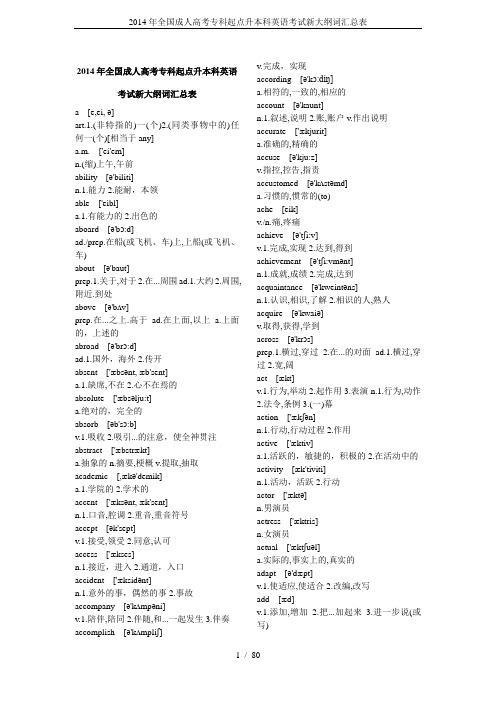
2014年全国成人高考专科起点升本科英语考试新大纲词汇总表a [e,ei, ə]art.1.(非特指的)一(个)2.(同类事物中的)任何一(个)[相当于any]a.m. ['ei'em]n.(缩)上午,午前ability [ə'biliti]n.1.能力2.能耐,本领able ['eibl]a.1.有能力的2.出色的aboard [ə'bɔ:d]ad./prep.在船(或飞机、车)上,上船(或飞机、车)about [ə'baut]prep.1.关于,对于2.在...周围ad.1.大约2.周围,附近.到处above [ə'bʌv]prep.在...之上.高于ad.在上面,以上a.上面的,上述的abroad [ə'brɔ:d]ad.1.国外,海外2.传开absent ['æbsənt, æb'sent]a.1.缺席,不在2.心不在焉的absolute ['æbsəlju:t]a.绝对的,完全的absorb [əb'sɔ:b]v.1.吸收2.吸引...的注意,使全神贯注abstract ['æbstrækt]a.抽象的n.摘要,梗概v.提取,抽取academic [,ækə'demik]a.1.学院的2.学术的accent ['æksənt, æk'sent]n.1.口音,腔调2.重音,重音符号accept [ək'sept]v.1.接受,领受2.同意,认可access ['ækses]n.1.接近,进入2.通道,入口accident ['æksidənt]n.1.意外的事,偶然的事2.事故accompany [ə'kʌmpəni]v.1.陪伴,陪同2.伴随,和...一起发生3.伴奏accomplish [ə'kʌmpliʃ] v.完成,实现according [ə'kɔ:diŋ]a.相符的,一致的,相应的account [ə'kaunt]n.1.叙述,说明2.账,账户v.作出说明accurate ['ækjurit]a.准确的,精确的accuse [ə'kju:z]v.指控,控告,指责accustomed [ə'kʌstəmd]a.习惯的,惯常的(to)ache [eik]v./n.痛,疼痛achieve [ə'tʃi:v]v.1.完成,实现2.达到,得到achievement [ə'tʃi:vmənt]n.1.成就,成绩2.完成,达到acquaintance [ə'kweintəns]n.1.认识,相识,了解2.相识的人,熟人acquire [ə'kwaiə]v.取得,获得,学到across [ə'krɔs]prep.1.横过,穿过2.在...的对面ad.1.横过,穿过2.宽,阔act [ækt]v.1.行为,举动2.起作用3.表演n.1.行为,动作2.法令,条例3.(一)幕action ['ækʃən]n.1.行动,行动过程2.作用active ['æktiv]a.1.活跃的,敏捷的,积极的2.在活动中的activity [æk'tiviti]n.1.活动,活跃2.行动actor ['æktə]n.男演员actress ['æktris]n.女演员actual ['æktʃuəl]a.实际的,事实上的,真实的adapt [ə'dæpt]v.1.使适应,使适合2.改编,改写add [æd]v.1.添加,增加2.把...加起来3.进一步说(或写)addition [ə'diʃən]n.1.加,加法2.附加物additional [ə'diʃənl]a.附加的,另外的address [ə'dres]n.1.地址,住址2.演说,讲话v.1.写姓名地址2.向...讲话,发表演说adequate ['ædikwit]a.1.充足的,足够的2.适当的,胜任的adjective ['ædʒiktiv]n.形容词adjust [ə' dʒʌst]v.1调节,改变...以适应2.校正,调整admire [əd'maiə]v.钦佩,赞赏,羡慕admit [əd'mit]v.1.承认,供认2.准许...进入,准许...加入adopt [ə'dɔpt]v.1.收养2.采取,采纳,采用adult [' ædʌlt]n.成年人a.成年的,充分长成的,成熟的advance [əd'va:ns]v.1.前进,向前移动2.取得进展,改进n.1.前进,进展2.预付,预支advanced [əd'va:nst]a.在前面的,先进的,高级的advantage [əd'va:ntidʒ]n.1.优点,优势,有利因素2.利益,好处adventure [əd'ventʃə]n.1.冒险,冒险活动2.奇遇adverb ['ædvə:b]n.副词advertisement [əd'və:tismənt]n.(=ad)广告advice [əd'vais]n.劝告,忠告,意见advise [əd'vaiz]v.劝告,通告,建议affair [ə'fεə]n.事件affect [ə'fekt]v.1.影响2.[在感情方面]喜欢afford [ə'fɔ:d]v.1.买得起,担负得起2.提供,给予afraid [ə'freid]a.1.害怕的,恐惧的2.犯愁的,不乐意的Africa ['æfrikə]n.非洲African ['æfrikən]a.非洲的,非洲人的n.非洲人after ['a:ftə]prep.在...以后,在...后面ad.以后,后来conj.在...以后afternoon [,a:ftə'nu:n]n.下午,午后again [ə'gein, əˈɡen,]ad.再一次,又一次against [ə'genst]prep.1.倚在,紧靠着2.逆,反(对),违反3.和...对比age [eidʒ]n.1.年龄2.时代,时期v.变老agency ['eidʒənsi]n.代理(处),代办处agent ['eidʒənt]n.代理人,代理商ago [ə'gəu]ad.以前agree [ə'gri:]v.同意,应允agreement [ə'gri:mənt]n.1.协定,协议,契约2.达成协议,同意agriculture ['ægrikʌltʃə]n.农业ahead [ə'hed]ad.在前,向前,提前aid [eid]n.1.帮助,援助2.助手,辅助手段v.帮助,援助aim [eim]v.1.把...瞄准,把...对准2.致力,旨在n.1.瞄准,对准2目标,目的air [εə]n.空气,大气,天空v.通风airline ['εəlain]n.1.航空公司2.(飞机的)航线airplane ['εəplein]n.飞机airport ['εəpɔ:t]n.机场,航空站alarm [ə'la:m]n.1.惊恐2.报警器v.1.使惊恐2.向...报警alike [ə'laik]a.同样的,相像的alive [ə'laiv]a.1.活着的2.有活力的,活跃的3.存在的all [ɔ:l]a.1.一切的,所有的2.全部的pron.全部,一切ad.完全地,都allow [ə'lau]v.1.允许,准许2. 同意给almost ['ɔ:lməust]ad.几乎,差不多alone [ə'ləun]a.1.单独的,孤独的2.独一无二的ad.1.单独地,独身地2.仅仅,只along [ə'lɔŋ]prep.沿着ad.向前aloud [ə'laud]ad.出声地,大声地alphabet ['ælfəbit]n.字母表already [ɔ:l'redi]ad.早已,已(经)also ['ɔ:lsəu]ad.1.同样地2.而且(也)although [ɔ:l'ðəu]conj.虽然,尽管altitude ['æltitju:d]n.高度,海拔altogether [,ɔ:ltə'geðə]ad.1.完全,全部地2.总起来说,总之3.总共always ['ɔ:lweiz]ad.1.总是,无例外地2.永远,始终amaze [ə'meiz]v.使大为惊奇,使惊愕America [ə'merikə]n.美洲,美国American [ə'merikən]a.1.美洲的,美国的2.美国人的n.美国人,美洲人among [ə'mʌŋ]prep.(-st)在...之中,在...之间amount [ə'maunt]n.数量,数额,总数v.1.合计,共计2.等同,接近(to)amuse [ə'mju:z]v.1.逗乐,逗笑2.给...提供娱乐an [ən,æn]art.1.(非特指的)一(个)2.(同类事物中的)任何一(个)[相当于any]analyse ['ænəlaiz]v.分析,分解analysis [ə'næləsis]n.分析,分解analyze ['ænəlaiz]v.分析,分解ancient ['einʃənt]a.古代的,古老的and [ənd,ænd]conj.1.和,与,及2.那么,则3.接连,又anger ['æŋgə]n.怒,愤怒v.使发怒,激怒angle ['æŋgl]n.1.角,角度2.角度,观点angry ['æŋgri]a.1.愤怒的,生气的2.(风浪等)狂暴的animal ['æniməl]n.动物,兽,牲畜a.动物的,野兽的announce [ə'nauns]v.1.宣布,宣告2.声称annoy [ə'nɔi]v.1.使恼怒,使烦恼2.打扰annual ['ænjuəl]a.每年的,年度的n.年鉴,年刊another [ə'nʌðə]a.1.再一个的,另一个的2.别的,不同的pron.另一个answer ['a:nsə]v.1.回答,答复2.适合,符合3.负有责任n.回答,答复,答案anxious ['æŋkʃəs]a.1.焦虑的,发愁的2.渴望的,急切的any ['eni]a.1.[否定,疑问,条件句中]任何的, 任何一种, 所有的anybody ['eni,bɔdi,'enibədi]a.1.[否定、疑问、条件句中]任何人anyhow ['enihau]ad.1.不管怎么说,无论如何2.不论用何种方法anyone ['eniwʌn]pron.任何人anything ['eniθiŋ]pron 1.[否定、疑问、条件句中]任何东西anyway ['eniwei]ad.1.不管怎么说,无论如何2.不论以何种方式anywhere ['enihwεə]ad.1.[否定、疑问、条件句中]任何地方apart [ə'pa:t]ad.1.相间隔,成距离2.分离,分开apartment [ə'pa:tmənt]n.1.[美]公寓apologize [ə'pɔlədʒaiz]v.(to for)道歉,认错apology [ə'pɔlədʒi]n.道歉,认错apparent [ə'pærənt]a.1.表面上的,貌似(真实)的2.显然的,明明白白的appear [ə'piə]v.l.出现,显露2.来到3.看来好像,似乎appearance [ə'piərəns]n.1.出现,露面2.外观,外貌appetite ['æpitait]n.1.食欲,胃口2.欲望,爱好apple ['æpl]n.苹果application [,æpli'keiʃən]n.1.申请,申请表2.应用,实施apply [ə'plai]v.1.申请,请求2.应用,运用,适用appoint [ə'pɔint]v.1.任命,委派2.约定,指定(时间、地点) appreciate [ə'pri:ʃieit]v.1.重视,欣赏2.对...作正确评价3.为...表示感激approach [ə'prəutʃ]v.靠近,接近n.1.接近2.途径,入门3.方式,方法appropriate [ə'prəupriət,ə'prəuprieit]适当的,恰当的,相称的approve [ə'pru:v]v.1.赞成,同意,称许2.批准,核准approximate [ə'prɔksimit]a.近似的,大约的v.(to)近似,接近April ['eiprəl]n.四月area ['εəriə]n.1.面积2.地区,地域3.领域,范围argue ['a:gju:]v.1.争论,争辩2.提出理由,(企图)证明argument ['a:gjumənt]n.1.争论,争辩2.理由,论据arise [ə'raiz]v.1.出现,发生2.由...引起,起源于arithmetic [ə'riθmətik]n.算术arm [a:m]n.1.臂,臂状物2.[pl.] n.武器, 兵种army ['a:mi]n.1.军队,军2.大群,大批around [ə'raund]ad.1.在周围,在附近 2.到处 3.大约prep.在...四周,在...附近arouse [ə'rauz]v.1.引起,激起,唤起2.唤醒arrange [ə'reindʒ]v.1.安排,筹划2.整理,使有条理,排列,布置arrest [ə'rest]v./n.逮捕,拘留arrival [ə'raivəl]n.1.到达,到来2.到达者,到达物arrive [ə'raiv]v.1.到来,到达2.来临3.(at)到达,达成arrow ['ærəu]n.1.箭,箭状物2.箭头符号art [a:t]n.1.美术,艺术2.技术,技艺3.[pl.]文科article ['a:tikl]n.1.文章,论文2.条款,条文3.物品4.冠词artificial [,a:ti'fiʃəl]a.1.人工的,人造的,人为的2.假的,矫揉造作的artist ['a:tist]n.艺术家,美术家as [əz,æz]conj.1.当...时,在...的同时2.如同...那样,以...的方式,像...一样 3.因为,由于 4.以致于prep.作为,当作ad.同样地,一样地ash [æʃ]n.灰,灰烬Asia ['eiʃə]n.亚洲Asian ['eiʃən]a.亚洲的,亚洲人的n.亚洲人aside [ə'said]ad.在旁边,到(或向)一边ask [a:sk]v.1.问,询问2.请求,要求3.邀请,约请asleep [ə'sli:p]a. 睡着的aspect ['æspekt]n.1.方面2.外表,面貌assemble [ə'sembl]v.1.集合,召集2.装配assign [ə'sain]vt.1.(to)指派,选派2.分配,布置(作业) 3.指定(时间,地点等)assignment [ə'sainmənt]n.1.(分派的)任务,(指定的)作业2.分配,批派assist [ə'sist]v.帮助,协助assistant [ə'sistənt]n.1.助手,助理2.助教a.助理的,辅助的associate [ə'səuʃieit]v.1.把...联系在一起,使结合2.交往n.伙伴,合伙人a.副的association [ə,səuʃi'eiʃən]n.1.协会,社团2.联合,结合,交往assume [ə'sju:m]v.1.假定,假设2.承担3.呈现,采取assure [ə'ʃuə]v.1.使确信,使放心2向...保证astonish [əs'tɔniʃ]v.使惊讶astronaut ['æstrənɔ:t]n.宇航员as...as像,如同,与...一样at [æt,ət]prep.1.在...里,在...上2.在...时刻3.向,朝4.[表示价格、速度等]Atlantic [ət'læntik]a.大西洋的n.[the~]atmosphere ['ætməs,fiə]n.1.大气,大气层2.空气3.气氛4.大气压atom ['ætəm]n.1.原子2.微粒,微量attach [ə'tætʃ]v.1.系,贴,装,连接2.使成为一部分,使附属3.使依恋attack [ə'tæk]v.1.攻击,进攻,抨击2.(风雨、疾病等)侵袭n.1.攻击,进攻,抨击2.(疾病的)突然发作attempt [ə'tempt]v./n.企图,试图attend [ə'tend]v.1.出席,参加2.照料,护理3.(to)专心于,致力于attention [ə'tenʃən]n.注意,留心attitude ['ætitju:d]n.1.态度,看法2.姿势attract [ə'trækt]v.吸引,引起...的注意,有吸引力attractive [ə'træktiv]a.有吸引力的,引起注意的audience ['ɔ:djəns]n.听众,观众,读者August ['ɔ:gəst]n.八月aunt [a:nt]n.伯母,婶母,姑母,姨母,舅母Australia [ɔ'streiljə]n.澳大利亚,澳洲Australian [ɔ'streiljən]a.1.澳大利亚(人)的2.澳洲区的n.澳大利亚人author ['ɔ:θə]n.作者authority [ɔ:'θɔriti]n.1.[pl.]权威;2. 权力3. 官方4. 专家5. 行政管理机构automatic [,ɔ:tə'mætik]a.自动的automobile ['ɔ:təməubi:l]n.(=auto)汽车autumn ['ɔ:təm]n.秋天,秋季available [ə'veiləbl]a.1.可利用的,可获得的2.可取得联系的,可接见的avenue ['ævənju:,'ævinju:]n.林荫道,大街average ['ævəridʒ]n.平均数,平均a.平常的,通常的v.平均avoid [ə'vɔid]v.避免,避开awake [ə'weik]a.醒着的v.唤醒,使觉醒award [ə'wɔ:d]n.奖,奖品,奖状v.授予,给予aware [ə'wεə]意识到,知道的away [ə'wei]ad.远离,离开awful ['ɔ:ful]a.1.使人产生敬畏之心,可怕的2.极度的,极坏的awkward ['ɔ:kwəd]a.1.粗笨的,笨拙的2.尴尬的,棘手的3.使用不便的B.C. ['bi:'si:]n.(缩)公元前=before Christbaby ['beibi]n.婴儿back [bæk]ad.1.向后2.回原处,回复原状3.还,回n.背,背面,后面a.背后的,后面的v.后退,倒退2.支持background ['bækgraund]n.背景backward ['bækwəd]ad.向后,朝反方向a.1.向后的,倒的2.落后的,进步慢的bad [bæd]a.1.坏的,不好的2.严重的,厉害的3.腐败的badly ['bædli]ad.1.坏,差,拙劣地2.严重地,厉害地bag [bæg]n.1.袋2.钱包baggage ['bægidʒ]n.行李bake [beik]v.1.烘,焙,烤2.烧硬,烘干(砖块、陶器等) balance ['bæləns]v.1.使平衡2.称n.1.天平,称2.平衡,均衡3.结存,结欠ball [bɔ:l]v.1.球,球状物2.(盛大,正式的)舞会balloon [bə'lu:n]n.气球banana [bə'na:nə]n.香蕉bank [bæŋk]n.1.银行,库存2.岸,堤bar [ba:]n.1.酒吧间,售酒(或食物、饮料)的柜台2.条,块,杆3.栅,栏v.阻止,拦阻barber ['ba:bə]n.理发师bare [bεə]a.1.赤裸的,不穿衣服的,不戴帽的2.光秃秃的,无遮盖的3.仅仅的,光是的v.露出,暴露bargain ['ba:gin]n.1.交易2.特价商品v.讨价还价base [beis]n.1.基,底2.基础,根据v.(on)把...建立在...基础上basic ['beisik]a.基本的,基础的basin ['beisn]n.1.盆,脸盆2.盆地basis ['beisis]n.基础,根据basket ['ba:skit]n.篮,篓basketball ['ba:skitbɔ:l]n.篮球bat [bæt]n.1.球拍2.蝙蝠bath [ba:θ]n.1.浴,洗澡2.浴缸v.[英]洗澡bathe [beið]v.1.[美] 沐浴, 洗澡, (光线)充满bathroom ['ba:θrum,'ba:θru:m]n.1.浴室2.盥洗室battery ['bætəri]n.电池(组)battle ['bætl]n.战役,战斗,斗争v.作战,搏斗bay [bei]n.1.(海或湖泊的)湾2.山脉的低凹处be [bi:,bi]v.1.是,就是2.表示,意味着3.等于,值4.成为,变成5.在,存在aux.v.1.[与动词的现在分词连用,构成各种进行时态]beach [bi:tʃ]n.海滩,湖滩,河滩beam [bi:m]n.1.(光线的)束,柱2.横梁bear [bεə]n.熊v.1.忍受,容忍2.负担,承担3.结(果实),生(孩子)beard [biəd]n.胡须beast [bi:st]n.1.兽,野兽,牲畜2.凶残的人,令人厌憎的人beat [bi:t]v.1.(接连地)打,击2.(心脏等)跳动3.打败,战胜n.1.(心脏等的)跳(声) 2.有节奏的敲击(声)beautiful ['bju:təful]a.美的,美丽的beauty ['bju:ti]n.1.美,美丽2.美人,美的东西because [bi'kɔz]conj.因为become [bi'kʌm]v.变成,成为,开始变得bed [bed]n.1.床,床位2.(苗)床,坛3.(河)床,(湖、海的)底bee [bi:]n.蜜蜂beef [bi:f]n.牛肉beer [biə]n.啤酒before [bi'fɔ:]prep.1.(指时间)在...以前 2.(指位置)在...前面 3.(指顺序、重要性等)在...之前,先于conj.在...以前ad.1.较早2.以前,以往beg [beg]v.1.乞求,乞讨2.恳求,请求begin [bi'gin]v.开始beginning [bi'giniŋ]n.开始,开端behalf [bi'ha:f]n.利益behave [bi'heiv]v.1.举止端正,表现2.(机器等)运转behaviour [bi'heivjə](=behavior)n.1.行为,举止2.(机器等)运转情况behind [bi'haind]prep.在...的背后,(遗留)在...后面,落后于ad.在背后,向后,落在后面being ['bi:iŋ]n.1.存在,生存2.生物,人belief [bi'li:f]n.1.相信,信任,信赖2.信念3.信仰4.信条believe [bi'li:v]v.1.相信,笃信,信任2.认为,猜想bell [bel]n.钟,铃belong [bi'lɔŋ]v.1.(在分类上)属,应归入2.(to)(在所有权,关系等方面)属于below [bi'ləu]prep.1.[指位置]在…下面belt [belt]n.腰带,皮带bench [bentʃ]n.长凳,长椅bend [bend]v.使弯曲n.弯曲,弯曲处beneath [bi'ni:θ]prep.在...下面,在...底下ad.在下方benefit ['benifit]n.益处,好处v.有益于,得益beside [bi'said]prep.1.在...旁边,在...附近2.和......相比besides [bi'saidz]ad.而且,此外prep.除...之外(还)best [best]a.最好的ad.最好,最bet [bet]v.打赌,以...打赌,与...打赌n.1.打赌2.赌金,赌注better ['betə]a.较好的,更好的ad.更好地between [bi'twi:n]prep.在...(两者)之间beyond [bi'jɔnd]prep.1.在(或向)...的那边,远于2.迟于3.超出ad.在更远处Bible ['baibl]n.《圣经》bicycle ['baisikl]n.自行车big [big]a.大的,巨大的2.重要的,重大的bike [baik]n.(口)自行车bill [bil]n.1.账单2.单子,清单3.纸币,钞票billion ['biljən]num.1.[美、法]十亿bind [baind]v.捆,绑,捆扎biology [bai'ɔlədʒi]n.生物学bird [bə:d]n.鸟,禽birth [bə:θ]n.1.出生,分娩2.出身,家世,血统3.起源,根源birthday ['bə:θdei]n.生日bit [bit]n.一点,一些,一片bite [bait] (过去式)bitv./n.咬,叮bitter ['bitə]a.1.痛苦的2.有苦味的black [blæk]a.1.黑色的2.黑暗的n.1.黑色2.黑人blackboard ['blækbɔ:d]n.黑板blame [bleim]v.1.指责,责备,责怪2.(on,onto)归咎于,把...归咎于n.1.(过错、事故等的)责任2.指责,责备blank [blæŋk]a.1.空白的,空着的2.茫然的,无表情的n.1.空白2.空白表格,空白处blanket ['blæŋkit]n.毛毯,毯子blind [blaind]a.1.瞎的,失明的2.盲目的v.使失明block [blɔk]n.1.街区,街段2.大块(木料或石料、金属、冰)3.障碍物,阻碍物v.堵塞,阻塞blood [blʌd]n.1.血,血液2.血统,门第blow [bləu]v.1.吹,吹动2.吹气3.吹响4.爆炸n.一击,打击,捶打blue [blu:]a.1.蓝色的2.(皮肤等)青灰色的3.沮丧的,忧郁的n.蓝色board [bɔ:d]n.1.板,木板,纸板2.委员会,董事会3.(指包饭)伙食4.船舷v.上(船、车、飞机)boast [bəust]v.1.自夸,夸耀,吹嘘2.以拥有...而自豪n.自吹自擂,自夸的话boat [bəut]n.船,小船body ['bɔdi]n.1.身体,躯体,主体2.尸体3.物体4.(一)群,一批boil [bɔil]v.沸腾,煮沸bold [bəuld]a.1.勇敢的,无畏的2.冒失的3.粗体,黑体的bomb [bɔm]n.炸弹v.轰炸,投弹bond [bɔnd]n.1.联结,联系2.粘结剂,粘合剂3.公债,债券bone [bəun]n.骨,骨骼book [buk]n.书,书籍v.预计,订(戏票、车票、房间等) boot [bu:t]n.靴border ['bɔ:də]n.1.边,边缘,界线2.边界,边境v.1.与...接壤,毗邻2.接近bore [bɔ:]v.1.使厌烦,使厌倦2.钻(孔),凿(井),挖(通道) n.令人讨厌的人(或事)born [bɔ:n] (bear的过去分词)a.1.出生的,产生的2.天生的borrow ['bɔrəu]v.借,借入boss [bɔs]n.老板,上司v.指挥,发号施令both [bəuθ]pron.两者(都),双方(都) a.两...(都),两个...(都)bother ['bɔðə]v.1.打扰,麻烦2.担心,烦恼n.烦恼,焦急bottle ['bɔtl]n.瓶bottom ['bɔtəm]n.底,底部bound [baund] (bind的过去式和过去分词)a.1.一定的,必然的2.受约束的,有义务的3.(for, to)准备到...去的,开往(或驶往) (v)跳跃,弹回bowl [bəul]n.碗,钵box [bɔks] n.1.箱,盒2.包厢v.拳击boy [bɔi]n.男孩brain [brein]n.1.脑,[pl.]智力branch [bra:ntʃ]n.1.树枝,分枝2.(机构的)分部,分号3.(学科的)分科,分支brand [brænd]n.商标,(商品的)牌子v.1.打烙印于,以烙铁打(标记)2.把...铭刻,铭刻于brave [breiv]a.勇敢的bread [bred]n.面包break [breik]v.1.打破,使碎裂2.损坏,弄坏3.破坏,违反 4.中止,中断n.(课间、工间)休息时间breakfast ['brekfəst]n.早餐v.进早餐breath [breθ]n.气息,呼吸breathe [bri:ð]v.呼吸brick [brik]n.1.砖2.砖块状物bridge [bridʒ]n.桥,桥梁brief [bri:f]a.简短的,简洁的v.向...作简要的介绍bright [brait]a.1.明亮的,晴朗的 2.聪敏的,机灵的 3.欢快的brilliant ['briljənt]a.1.光辉的,灿烂的2.卓越的,杰出的bring [briŋ]v.1.带来,拿来2.引起,导致Britain ['britən]n.不列颠,英国British ['britiʃ]a.(大)不列颠(人)的,英国(人)的n.[the~] broad [brɔ:d]a.1.宽的,阔的,广阔的2.广泛的3.宽容的broadcast ['brɔ:dka:st]n./v.广播,播音brother ['brʌðə]n.兄弟brown [braun]n./a.棕色(的),褐色(的)brush [brʌʃ]n.1.刷子,毛刷2.画笔v.刷,写,画,掸,拂,擦build [bild]v.1.建筑,建造2.建立3.增强,增进building ['bildiŋ]n.1.建筑物,大楼2.建筑bunch [bʌntʃ]n.束,捆,串burden ['bə:dən]n.担子,负担burn [bə:n]v.1.燃烧,烧着2.烧毁3.灼伤n.烧伤,灼伤burst [bə:st]v./n.爆炸,爆裂bury ['beri]v.1.埋葬,葬2.掩埋,埋藏bus [bʌs]n.公共汽车bush [buʃ]n.灌木,灌木丛business ['biznis]n.1.商业,生意2.事务busy ['bizi]a.忙的,忙碌的,繁忙的but [bʌt]conj.但是,可是,然而prep.[常用于nobody, all, who等词后面]除…以外butter ['bʌtə]n.黄油,奶油v.涂黄油于...上button ['bʌtən]n.1.纽扣2.按钮,开关v.扣上,扣紧v.买,购买by [bai]prep.1.在...旁边,靠近2.到(某时)之前,不迟于3.被,由4.靠,通过,以5.根据,按照ad.在近旁,经过cabbage ['kæbidʒ]n.洋白菜,卷心菜cable ['keibl]n.1.索,缆2.电缆,海底电缆3.电报v.拍电报cake [keik]n.饼,糕,蛋糕calculate ['kælkjuleit]v.1.计算,核算2.计划,打算calendar ['kælində]n.日历,月历call [kɔ:l]v.1.叫做,称为2.叫,喊3.打电话给n.1.呼叫,喊叫2.访问3.(一次)电话,通电话calm [ka:m]a.1.平静的,无风的2.镇静的,镇定的v.使平静,使镇定camel ['kæməl]n.骆驼camera ['kæmərə]n.照相机camp [kæmp]n.野营,营地,账篷v.设营,宿营campaign [kæm'pein]n.战役,运动campus ['kæmpəs]n.(大学)校园can [kæn,kən]aux.v.1.能,会2.可以3.可能n.罐头Canada ['kænədə]n.加拿大Canadian [kə'neidjən]a.1.加拿大的2.加拿大人的n.加拿大人canal [kə'næl]n. 运河;水道;管道;灌溉水渠cancel ['kænsəl]n.1.取消,撤消2.删去,划掉cancer ['kænsə]n.癌candidate ['kændidit]n.1.候选人,候补者2.投考者,申请求职者candle ['kændl]n.蜡烛cap [kæp]n.1.帽子,便帽2.帽状物,盖,套,罩capable ['keipəbl]a.有能力的,有才能的capacity [kə'pæsiti]n.1.容量,容积2.能力capital ['kæpitl]n.1.资本,资金2.首都3.大写字母a.主要的,基本的captain ['kæptin]n.1.领袖,首领2.船长,舰长3.队长v.率领,指挥capture ['kæptʃə]v./n.捕获,俘获car [ka:]n.汽车,轿车carbon ['ka:bən]n.碳card [ka:d]n.卡,卡片,名片,信用卡care [kεə]v.1.关心,介意2.喜欢,愿意n.1.小心,注意2.照顾,关怀career [kə'riə]n.生涯,职业,经历careful ['kεəful]a.小心的,仔细的careless ['kεəlis]a.粗心的,疏忽的cargo ['ka:gəu]n.船货,货物carpet ['ka:pit]n.地毯carry ['kæri]v.1.运送,运载,携带2.传送,输送cart [ka:t]n.大车,手推车case [keis]n.1.情况,事实2.病例3.案件4.箱,盒,容器cash [kæʃ]n.钱,现款cassette [kə'set,kæ'set]n.盒式录音带cast [ka:st]v.1.投,扔,抛2.浇铸,铸造castle ['ka:sl]n.城堡cat [kæt]n.猫catalog ['kætəlɔ:g] (=catalogue)n.目录,目录簿(或册)v.1.将...编入目录2.将(书籍、资料等)编目分类catch [kætʃ]v.1.捉住,逮住,抓住2.赶上,追上3.听清楚,领会4.染上,感染cattle ['kætl]n.牛cause [kɔ:z]n.1.原因,起因,理由2.事业(奋斗的)目标v.使产生,引起cave [keiv]n.洞穴,山洞cease [si:s]v./n.停止,中止ceiling ['si:liŋ]n.天花板celebrate ['selibreit]v.庆祝cell [sel]n.1.细胞2.小室3.电池cent [sent]n.1.分,分币2.百(仅用于百分比per cent一词中)centimeter ['senti,mi:tə]n.厘米,公分central ['sentrəl]a.1.中央的,中心的2.主要的,起支配作用的centre ['sentə]n.中心,中央v.集中century ['sentʃuri]n.世纪,百年ceremony ['seriməni]n.1.典礼, 仪式2.礼节,礼仪certain ['sə:tən]a.1.确实的,无疑的2.肯定的,必然的3.某,某一certainly ['sə:tənli]ad.1.必定,一定2.当然,行certificate [sə'tifikit]n.证(明)书,执照chain [tʃein]n.1.链,链条2.一连串,连串v.用链条拴住chair [tʃεə]n.椅子chairman ['tʃεəmən]n.主席,议长,会长chalk [tʃɔ:k]n.白垩,粉笔challenge ['tʃælindʒ]n.挑战v.向...挑战champion ['tʃæmpjən]n.冠军,得一等奖者chance [tʃa:ns]n.1.机会,机遇2.可能性,偶然性3.机缘,幸运v.碰巧,偶然发生change [tʃeindʒ]n.1.改变,变化2.找头,零钱v.1.改变,变化2.换,兑换channel ['tʃænl]n.1.海峡,水道,航道2.渠道3.频道chapter ['tʃæptə]n.章,回,篇character ['kæriktə]n.1.性格,品质2.特性,特征3.人物,角色4.(书写或印刷)符号,(汉)字characteristic [,kæriktə'ristik]a.特有的,典型的n.特性,特征charge [tʃa:dʒ]v.1.索价,要...支付2.控告,指控3.充电n.1.价钱,费用2.控告,指控3.电荷,充电chart [tʃa:t]n.图,图表cheap [tʃi:p]a.1.廉价的,便宜的2.劣质的,低劣的cheat [tʃi:t]v.欺骗,欺诈行为n.1.欺骗,欺诈行为2.骗子check [tʃek]v.1.检查,核对2.制止n.1.检查,核对2.支票,账单cheer [tʃiə]v.1.使振奋,使高兴2.欢呼,喝彩n.振奋,欢呼,喝彩cheerful ['tʃiəful]a.愉快的,高兴的chemical ['kemikəl]a.化学的n.化学制品chemist ['kemist] n.化学家,药剂师chemistry ['kemistri]n.化学cheque [tʃek]n.支票chest [tʃest]n.1.胸,胸腔2.柜子,橱chicken ['tʃikin]n.小鸡,鸡肉chief [tʃi:f]n.首领a.首要的child [tʃaild]n.小孩,儿童childhood ['tʃaildhud]n.童年,幼年chin [tʃin]n.下巴,颏China ['tʃainə]n.1.中国2.[china]Chinese [`tʃai'ni:z]a.1.中国的,中国人的2.中国话的,汉语的n.1.中国人2.中国话,汉语chocolate ['tʃɔkəlit]n.1.巧克力,巧克力糖2.深褐色choice [tʃɔis]n.1.选择,抉择2.供选择的品种a.上等的,精选的choose [tʃu:z]v.选择,挑选Christian ['kristjən]n.基督教徒Christmas ['krisməs]n.圣诞节church [tʃə:tʃ]n.1.教堂cigarette [,sigə'ret]n.(=cigaret)香烟,纸烟cinema ['sinimə]n.1.电影2.电影院circle ['sə:kl]n.1.圆,圆周2.圈子,阶层v.环绕,旋转circuit ['sə:kit]n.1.电路,线路2.环行,巡回circumstance ['sə:kəmstəns]n.1.环境,条件,情况2.[pl.]客观形势citizen ['sitizn]n.1.公民2.市民, 城镇居民city ['siti]n.城市,都市civil ['sivl]a.1.公民的,公民个人的 2.国内的,公民间的3.文明的,有教养的civilization [,sivilai'zeiʃən]n.文明,文化claim [kleim]v.1.声称,自称,主张2.对...提出要求,索取n.要求,主张,断言clap [klæp]v.拍手,(用手)拍,击n.拍手,鼓掌class [kla:s]n.1.班级2.课,上课3.阶级,社会等级,级别4.种类,门类classical ['klæsikəl]a.古典的,经典的classify ['klæsifai]v.把...分类,把...分级classmate ['kla:smeit]n.同班同学classroom ['kla:srum]n.教室,课堂clean [kli:n]a.清洁的,干净的v.把...弄干净,除去...的污垢clear [kliə]a.1.清晰的,清楚的2.晴朗的3.畅通的,无阻的ad.清晰地,清楚地v.1.使清澈,使明净2.打扫,清除clerk [kla:k]n.店员,办事员,职员clever ['klevə]a.聪明的,机灵的climate ['klaimit]n.气候climb [klaim]v./n.攀登,爬clock [klɔk]n.钟close [kləuz,kləus] v. [kləuz]1.关,关闭2.结束,终止a.[kləus]1.密切的,亲密的2.近的,接近的3.严密的4.关闭的cloth [klɔθ]n.1.布,织物,衣料2.(一块)抹布clothe [kləuð]v.给...穿衣服,给...提供衣服clothes [kləuðz]n.衣服clothing ['kləuðiŋ]n.服装,衣着cloud [klaud]n.1.云2.遮暗物,阴影3.一大群cloudy [klaudi]a.1.多云的2.云一般的3.模糊不清的club [klʌb]n.1.俱乐部,夜总会2.棍棒,球棒clue [klu:]n.线索,提示coach [kəutʃ]n.1.长途公共汽车2.(铁路)旅客车厢3.教练v.训练,指导coal [kəul]n.煤,煤块coarse [kɔ:s]a.1.粗的,粗糙的2.粗劣的3.粗俗的coat [kəut]n.1.上衣,外套2.表皮3.层覆盖物v.涂上,盖上cock [kɔk]n.1.公鸡2.龙头,旋塞,阀门coffee ['kɔfi]n.咖啡coin [kɔin]n.硬币,钱币v.铸币cold [kəuld]a.1.冷的,寒冷的2.冷淡的n.1.冷,寒冷2.伤风,感冒collar ['kɔlə]n.1.衣领,领子2.(狗等的)项圈colleague ['kɔli:g]n.同事,同僚collect [kə'lekt]v.1.收集,聚集2.取,接3.收(账、税等)collective [kə'lektiv]a.集体的,共同的n.团体,集体college ['kɔlidʒ]n.大学,学院colour ['kʌlə]n.1.颜色,彩色2.颜料v.给...着色,染色column ['kɔləm]n.1.柱,圆柱2.柱形物3.(数)列4.栏,专栏(文章)comb [kəum]n.梳子v.梳理combine [kəm'bain]n.结合,联合,化合come [kʌm]v.1.来,来到,来临2.出现于3.变成,成为comfort ['kʌmfət]n.安慰,舒适v.安慰,慰问,使舒适comfortable ['kʌmfətəbl]a.舒适的,舒服的,舒坦的command [kə'ma:nd]v./n.命令,指挥,控制n.掌握,运用能力comment ['kɔment]n./v.注解,评论commerce ['kɔmə:s]n.商业,贸易commercial [kə'mə:ʃəl]a.商业的,商务的commit [kə'mit]v.犯(罪),干(坏事)committee [kə'miti]n.委员会common ['kɔmən]a.1.平常的,普通的2.共同的communicate [kə'mju:nikeit]v.1.传达,传播2.交流,通讯,交际communication [kə,mju:ni'keiʃən]n.1.传达,通讯,交流2.(pl.)通讯系统,交通系统communism ['kɔmjunizəm]n.共产主义communist ['kɔmjunist]n.共产主义者,共产党员a.共产主义的,共产党的community [kə'mju:niti] n.1.社区,社会2.共同体company ['kʌmpəni]n.1.公司,商号2.同伴,陪伴comparative [kəm'pærətiv]比较的,相对的compare [kəm'pεə]v.比较,对照compass ['kʌmpəs]n.1.罗盘,罗盘仪2.[pl.]圆规compete [kəm'pi:t]v.竞争,比赛competition [,kɔmpi'tiʃən]n.竞争,比赛complain [kəm'plein]v.抱怨,发牢骚complete [kəm'pli:t]a.完整的,完全的,圆满的v.完成,使完美complex ['kɔmpleks]a.1.组合的2.复杂的n.复合体complicated ['kɔmplikeitid]a.复杂的,难懂的compose [kəm'pəuz]v.1.组成,构成 2.创作(音乐,文字作品),为...谱曲composition [,kɔmpə'ziʃən]n.1.构成,组成,成分2.作文,作品,乐曲3.写作,作曲compound [kəm'paund,'kɔmpaund]n.化合物,复合物a.得分的,化合的comprehension [,kɔmpri'henʃən]n.1.理解(力) 2.理解力测验comprehensive [`kɔmpri'hensiv]广泛的,综合的computer [kɔm'pju:tə]n.计算机,电脑comrade ['kɔmrid,'kɔmreid]n.同志,同伴,朋友concentrate ['kɔnsəntreit]v.1.集中,专心2.集合,聚集3.浓缩n.浓缩物concept ['kɔnsept]n.概念,观念,思想concern [kən'sə:n]n.1.关心,挂念2.关系,关联v.1.涉及,有关于2.关心,挂念concerning [kən'sə:niŋ]prep.关于concert ['kɔnsət]n.音乐会,演奏会conclude [kən'klu:d]v.1.推断出,推论出2.作出(最后)决定3.结束,终止conclusion [kən'klu:ʒən]n.1.结论,推论2.结束,终结condition [kən'diʃən]n.1.状况,状态2.[pl.]环境conduct ['kɔndʌkt]v.1.处理,管理2.指挥3.传导,传(热,电)n.举止,行为conference ['kɔnfərəns]n.(正式)会议confess [kən'fes]v.坦白,供认,承认confidence ['kɔnfidəns]n.1.信任,信心,自信2.私下里说的话confident ['kɔnfidənt]a.确信的,自信的confirm [kən'fə:m]v.1.证实,肯定,确定2.巩固,加强3.批准,确认conflict ['kɔnflikt,kən'flikt]n./v.冲突,抵触,战斗confuse [kən'fju:z]v.使混乱,混淆congratulate [kən'grætjuleit]v.祝贺,向...道喜congress ['kɔŋgres]n.1.代表大会2.国会,议会connect [kə'nekt]v.连接,连结,联系conquer ['kɔŋkə]v.1.攻克,征服2.破除,克服conscious ['kɔnʃəs]a.1.意识到的,自觉的2.有意的,存心的3.神志清醒的consent [kən'sent]n.同意,赞成v.(to)同意,赞成consequence ['kɔnsikwəns]n.结果,后果consequently ['kɔnsikwəntli]ad.所以,因此conservation [,kɔnsə'veiʃən]n.1.保存,保护2.守恒,不灭conservative [kən'sə:vətiv]a.保守的,守旧的,传统的n.保守的人,反对进步的人consider [kən'sidə]v.1.认为,把...看作2.考虑,细想3.关心,考虑到considerable [kən'sidərəbl]a.1.相当大的2.值得考虑的consist [kən'sist]v.1.(of)组成,构成2.(in)存于,存在于constitution [,kɔnsti'tju:ʃən]n.1.章程,宪法2.体质,素质3.构造construction [kən'strʌkʃən]n.1.建造,构造2.建造物,建筑物consult [kən'sʌlt]v.1.请教,向...咨询,找...商量2.查阅,查看consume [kən'sju:m]v.消耗,花费contact ['kɔntækt]v./n.接触,联系,交往contain [kən'tein]v.1.包含,容纳2.相当于,折合content ['kɔntent]n.1.[pl]内容contest [kən'test,'kɔntest]n. ['kɔntest]竞争,竞赛,比赛v. [kən'test]竞赛,比赛,争论continent ['kɔntinənt]n.大陆,洲continual [kən'tinjuəl]a.从不间断的,不停的continue [kən'tinju:]v.延伸,继续,坚持下去continuous [kən'tinjuəs]a.不断延伸的,连续不断的contract ['kɔntrækt,kən'trækt]n. ['kɔntrækt](承包)合同.(承包)契约v.[kən'trækt]1.订合同,订契约2.使缩小,使收缩contrary ['kɔntrəri]a.相反的,对抗的n.相反,相反事物,对立面contrast ['kɔntra:st,kən'tra:st]v.['kən'tra:st]1.对比,对照2.形成对比,对比之下显出区别n.['kɔntra:st]对比,对照v.形成对比,对比之下显出区别contribute [kən'tribju:t]v.1.捐献,捐助,贡献2.投稿control [kən'trəul]v./n.1.控制,支配2.克制,抑制convenient [kən'vi:njənt]a.省力的,方便的conversation [,kɔnvə'seiʃən]n.(友好,随便的)谈话,会话convey [kən'vei]v.1.传送,传达,表达2.运送,输送convince [kən'vins]v.使确信,使信服cook [kuk]v.烹调,煮,烧n.厨子,炊事员cool [ku:l]a.1.凉的,凉快的2.冷静的,冷淡的v.使变凉,使冷静下来cooperate [kəu'ɔpəreit]vi.合作,协作,配合cope [kəup]v.(with)1.竞争,对抗2.对付,妥善处理copper ['kɔpə]n.1.铜2.铜制品,铜币copy ['kɔpi]n.1.抄件,副本2.(一)本,(一)份v.抄写,复印,临摹core [kɔ:]n.1.果心2.核心,最重要部分,要点corn [kɔ:n]n.谷物,小麦,玉米corner ['kɔ:nə]n.1.角,墙角2.街角,弯角corporation [,kɔ:pə'reiʃən]n.公司correct [kə'rekt]a.1.正确的,对的2.合适的,得体的v.改正,纠正correspond [,kɔri'spɔnd]v.1.(to, with)相符合,成一致2.(to)相当,相类似3.(with)通信corresponding [,kɔri'spɔndiŋ]a.1.相应的,相当的,对等的2.符合的,一致的,相同的cost [kɔst]n.价格,成本,费用v.价钱为,(使)花费cottage ['kɔtidʒ]n.小屋,村舍cotton ['kɔtən]n.1.棉,棉花2.棉线,棉纱cough [kɔf]v./n.咳嗽could [kud,kəd]aux.v.1.can的过去式2.[含有不确定或婉转、谦逊的意味]能,可以council ['kaunsəl]n.委员会,理事count [kaunt]v.1.数到,点...的数目2.计算,把...算入n.记数,计算,总数counter ['kauntə]n.1.柜台2.计数器vt.反对,反抗ad.反方向地,对立地country ['kʌntri]n.1.国家2.乡下,农村countryside ['kʌntrisaid]n.农村,乡下couple ['kʌpl]n.1.夫妻2.一对,一双3.两三(个),一些v.连接,结合courage ['kʌridʒ]n.勇气,胆识course [kɔ:s]n.1.课程,教程2.过程,进程3.(一)道(菜) court [kɔ:t]n.1.法庭,法院2.球场3.院子cousin ['kʌzn]n.堂(或表)兄弟,堂(或表)姊妹cover ['kʌvə]v.1.盖,覆盖2.包括,涉及n.(书的)封面,盖子,套子cow [kau]n.母牛,奶牛crash [kræʃ]。
2020年重庆“专升本”统一选拔考试大纲《大学英语》

重庆市普通高校“专升本”统一选拔考试大纲《大学英语》(2020年版)(考试科目代码40)Ⅰ.考试大纲适用对象及考试性质本大纲适用于重庆市普通高校“专升本”的考生。
“专升本”考试结果将作为重庆市普通高校高职高专学生申请“专升本”的成绩依据。
本科院校根据考生考试成绩,按照已确定的招生计划择优录取。
因此,该考试应具有较高的信度、效度,必要的区分度和适当的难度。
Ⅱ.考试内容与要求根据重庆市普通高校对“专升本”的高职高专学生文化素质的要求,依据高等学校外语专业教学指导委员会制订的《高等学校英语专业英语教学大纲》(基础阶段)和教育部办公厅颁发的《大学英语课程教学要求(试行)》的要求,确定本学科考试内容。
一、语言知识考查考生对英语词汇和语法知识的掌握程度,以及对所学功能意念和话题的运用能力。
二、语言运用1.听力要求考生能听懂普通话题的独白和对话。
考生应能:(1)理解材料的主旨和大意(2)获取信息细节(3)根据内容进行推断(4)理解说话者的意图、观点和态度2.阅读要求考生能读懂各类题材的文章,并能从中获取相关信息。
考生应能:(1)理解文章的主旨和大意(2)了解事实和细节(3)根据文章所给信息进行判断和推理(4)根据上下文推断单词和短语的含义(5)理解作者的意图、观点和态度3.翻译要求考生能理解常用话题的文段,并能用所要求的语言准确表达原文意思。
考生应能:(1)根据上下文正确理解句子意义(2)运用正确的语法结构和恰当的词汇(3)准确而流畅地表达原文的意思4.写作要求考生根据要求进行英文写作。
考生应能:(1)完整表达所要求写作的内容,条理清晰(2)正确运用语言知识,表达流畅(3)使用正确的英文写作格式Ⅲ.考试形式与试卷结构一、考试形式考试采取闭卷笔试,考试时间为120分钟,试卷总分为120分。
二、试卷结构考试项目共有五个部分,即听力、词汇和结构、阅读理解、翻译和写作。
各部分测试题型和分值如下:第一部分听力考核考生理解所听对话和独白的能力。
2014年英语考试大纲
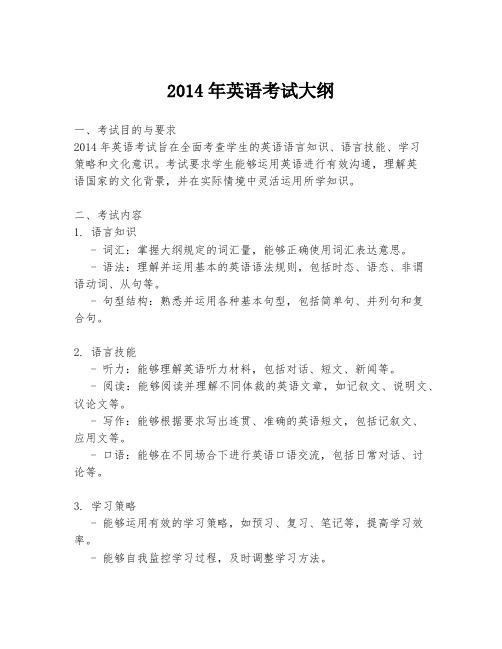
2014年英语考试大纲一、考试目的与要求2014年英语考试旨在全面考查学生的英语语言知识、语言技能、学习策略和文化意识。
考试要求学生能够运用英语进行有效沟通,理解英语国家的文化背景,并在实际情境中灵活运用所学知识。
二、考试内容1. 语言知识- 词汇:掌握大纲规定的词汇量,能够正确使用词汇表达意思。
- 语法:理解并运用基本的英语语法规则,包括时态、语态、非谓语动词、从句等。
- 句型结构:熟悉并运用各种基本句型,包括简单句、并列句和复合句。
2. 语言技能- 听力:能够理解英语听力材料,包括对话、短文、新闻等。
- 阅读:能够阅读并理解不同体裁的英语文章,如记叙文、说明文、议论文等。
- 写作:能够根据要求写出连贯、准确的英语短文,包括记叙文、应用文等。
- 口语:能够在不同场合下进行英语口语交流,包括日常对话、讨论等。
3. 学习策略- 能够运用有效的学习策略,如预习、复习、笔记等,提高学习效率。
- 能够自我监控学习过程,及时调整学习方法。
4. 文化意识- 了解英语国家的文化背景,包括历史、地理、社会习俗等。
- 能够在跨文化交流中展现出对不同文化的尊重和理解。
三、考试形式与题型1. 听力部分- 对话理解:通过听力材料理解对话内容。
- 短文理解:通过听力材料理解短文大意和细节信息。
- 新闻报道:通过听力材料理解新闻报道的主要内容。
2. 阅读部分- 阅读理解:通过阅读文章,回答相关问题,考查理解能力。
- 完形填空:在文章中填入合适的词汇或短语,考查语言运用能力。
3. 写作部分- 短文写作:根据给定的题目或提示,写出一篇连贯、准确的英语短文。
- 应用文写作:根据特定场合,写出相应的应用文,如书信、通知等。
4. 口语部分- 口语交流:通过与考官或同伴的对话,考查口语表达能力。
- 角色扮演:根据特定情境,扮演角色进行交流。
四、考试评分标准1. 听力部分:根据学生对听力材料的理解程度进行评分。
2. 阅读部分:根据学生对文章内容的理解以及答题的准确性进行评分。
《大学英语》(专升本)复习资料
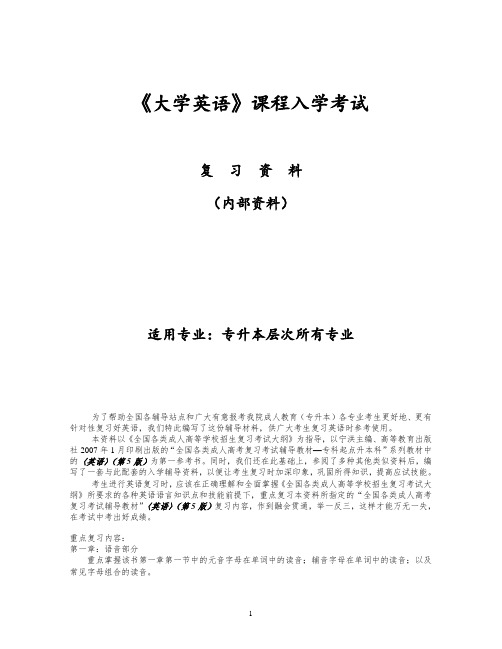
《大学英语》课程入学考试复习资料(内部资料)适用专业:专升本层次所有专业为了帮助全国各辅导站点和广大有意报考我院成人教育(专升本)各专业考生更好地、更有针对性复习好英语,我们特此编写了这份辅导材料,供广大考生复习英语时参考使用。
本资料以《全国各类成人高等学校招生复习考试大纲》为指导,以宁洪主编、高等教育出版社2007年1月印刷出版的“全国各类成人高考复习考试辅导教材—专科起点升本科”系列教材中的〈英语〉(第5版)为第一参考书。
同时,我们还在此基础上,参阅了多种其他类似资料后,编写了一套与此配套的入学辅导资料,以便让考生复习时加深印象,巩固所得知识,提高应试技能。
考生进行英语复习时,应该在正确理解和全面掌握《全国各类成人高等学校招生复习考试大纲》所要求的各种英语语言知识点和技能前提下,重点复习本资料所指定的“全国各类成人高考复习考试辅导教材”〈英语〉(第5版)复习内容,作到融会贯通,举一反三,这样才能万无一失,在考试中考出好成绩。
重点复习内容:第一章:语音部分重点掌握该书第一章第一节中的元音字母在单词中的读音;辅音字母在单词中的读音;以及常见字母组合的读音。
第二章:词汇与语法结构一、掌握第二章“第一节语法与词汇应试要点解析”中的以下基本语法规则:(一)词法(包括名词、冠词、代词、数词、形容词、副词、介词、动词、感叹词)(二)句法(包括基本句型、按用途分类的句子第1,2,3小点;)二、重点掌握第二章“第二节词汇与语法结构应试典型题解”中的以下部分:(一)名词部分的第1,2,3,5,6小点;(二)冠词部分的第1,2,4,5,6,7,12 小点;(三)代词部分的第1,2,4,5,6,7 小点;(四)介词部分的第A 和B部分;(五)形容词和副词部分的第4,5,8,9小点;(六)动词部分的第1,2,3,4,9,10小点;(七)‘非谓语动词’部分的第1,2,3,4,5,6小点;(八)‘情态动词’部分的第1,3,4,5,6小点;(九)‘虚拟语气’部分的第1,2,4小点;(十)‘主谓一致’部分的第A 和B部分;(十一)‘倒装’部分的第2,3,5,7小点以及(十二)‘从句’部分的第1,2,3,5,7小点。
2014年重庆市专升本《大学英语》考试大纲(推荐5篇)

2014年重庆市专升本《大学英语》考试大纲(推荐5篇)第一篇:2014年重庆市专升本《大学英语》考试大纲2014年重庆市专升本《大学英语》考试大纲一、考试大纲适用对象及考试性质本大纲适用于重庆市普通高校申请“专升本”的高职高专学生,目的在于考核学生达到《高等学校英语专业英语教学大纲》(基础阶段)的要求或《高职高专教育英语课程教学基本要求》A级以上要求的情况,检测学生是否具备本科阶段的英语学习能力。
按本大纲进行的考试系选拔性考试,其结果将作为重庆市普通高校高职高专学生申请“专升本”的成绩依据。
二、考试形式(一)试卷题型及分值分布序号考试项目题号考试内容题型分值I 听力理解 1—15 对话、实用会话、短文多项选择、填空 15分II 词汇和结构 16—30 词汇、语法结构多项选择、填空 15分III 阅读理解31—50 理解语篇,包括一般性和应用性文字材料多项选择、填空、匹配 40分IV 翻译 51—56 句子和段落句子翻译、段落翻译 15分V 写作57 简历表、申请书、邀请信、通知等写作书写、套写、填写 15分非英语专业考生只完成Ⅰ-Ⅴ部分,合计100分,按120分折算计入总分VI 附加部分 Section A 短文阅读约200词,辨认错误并改正错误辨错、改错 10分Section B 短文阅读约200词,写作约80词概要、提纲、摘要10分英语专业考生完成Ⅰ-Ⅵ部分,合计100分,按120分折算计入总分本考试主要考核考生的语言基础知识和应用技能。
考试项目共六个部分,即听力理解、词汇和结构、阅读理解、翻译、写作、附加部分,见下表。
试卷题型及分值分布表(二)考试方式考试采取闭卷笔试,考试时间为120分钟。
非英语专业试卷总分为100分,按120分折算;英语专业试卷总分为120分。
(三)考试内容及要求(一)听力理解(Part Ⅰ Listening Comprehension)考核考生理解所听对话、会话和短文的能力。
英语专升本作文提纲
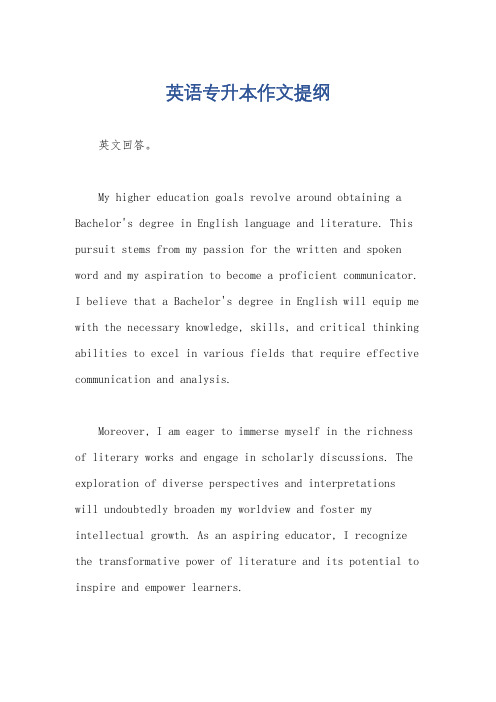
英语专升本作文提纲英文回答。
My higher education goals revolve around obtaining a Bachelor's degree in English language and literature. This pursuit stems from my passion for the written and spoken word and my aspiration to become a proficient communicator.I believe that a Bachelor's degree in English will equip me with the necessary knowledge, skills, and critical thinking abilities to excel in various fields that require effective communication and analysis.Moreover, I am eager to immerse myself in the richness of literary works and engage in scholarly discussions. The exploration of diverse perspectives and interpretationswill undoubtedly broaden my worldview and foster my intellectual growth. As an aspiring educator, I recognize the transformative power of literature and its potential to inspire and empower learners.Through coursework and extracurricular activities, Iaim to develop my fluency in the English language, enhance my writing and analytical abilities, and gain a deep understanding of literary theory and criticism. I am particularly interested in the intersection of language, culture, and society and am eager to delve into the nuances of rhetoric and discourse analysis.Furthermore, I am drawn to the interdisciplinary nature of English studies and believe that it will provide me with a solid foundation for lifelong learning. By engaging with texts from various genres, eras, and cultures, I hope to cultivate a multifaceted perspective that will enable me to connect with and communicate effectively with people from diverse backgrounds.中文回答。
2014年专升本(英语)真题试卷(题后含答案及解析)
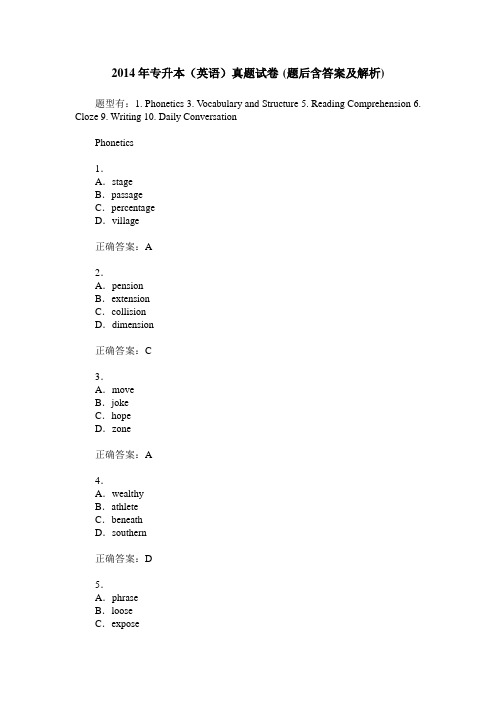
2014年专升本(英语)真题试卷(题后含答案及解析)题型有:1. Phonetics 3. V ocabulary and Structure 5. Reading Comprehension 6. Cloze 9. Writing 10. Daily ConversationPhonetics1.A.stageB.passageC.percentageD.village正确答案:A2.A.pensionB.extensionC.collisionD.dimension正确答案:C3.A.moveB.jokeC.hopeD.zone正确答案:A4.A.wealthyB.athleteC.beneathD.southern正确答案:D5.A.phraseB.looseC.expose正确答案:BPart I V ocabulary and StructureDirections: Each of the following sentences is provided with four choices. Choose the one that best completes the sentence. Then, mark your answer on the Answer Sheet.6.The relationship between parents and their children ______a strong influence on the character of the children.A.haveB.havingC.to haveD.has正确答案:D7.Only by telling the truth win the trust and support of your friends.A.you canB.can youC.you didD.did you正确答案:B8.These apple trees, ______I planted three years ago, have not borne any fruit.A.thatB.whatC.whichD.when正确答案:C9.Don’t remind me of that awful day : I______such a fool of myself.A.madeB.makeC.will makeD.am making正确答案:A10.My daughter is quite well now______a slight headache.A.besideB.besidesD.except for正确答案:D11.She is treated______better than I was.A.muchB.littleC.manyD.more正确答案:A12.If it had not rained yesterday, they______work on time.A.will finishB.will have finishedC.would finishD.would have finished正确答案:D13.They are studying the Solar System’s______planet, Saturn, and its moons. A.two largestB.largest twoC.second largestD.largest second正确答案:C14.I’d like to go with you: ______, my hands are full at the moment. A.howeverB.whateverC.wheneverD.wherever正确答案:A15.He entered the office hurriedly, ______the door open.A.leavingB.leftC.leaveD.to leave正确答案:A16.He had to quit the job______his ill health.A.asB.as forC.becauseD.because of正确答案:D17.She needs more friends of her own______.A.yearB.ageC.periodD.stage正确答案:B18.______, the training will help you become better at what you do.A.In the seasonB.In the periodC.In the long runD.In the long range正确答案:C19.Sea levels are______to rise between 7 and 23 inches by the end of 21st century.A.inspectedB.suspectedC.expectedD.detected正确答案:C20.Smoking and drinking may______heart disease and cancer.A.result fromB.lead toC.come fromD.get to正确答案:BPart III Reading ComprehensionDirections: In this part there are four passages. Each passage is followed by a number of comprehension questions. Readthe passages and choose the best answer to each question. Then, mark your answer by blackening the corresponding letter on the Answer Sheet.At first glance, there hardly seems to be any comparison between Ravenna and Rome, but back in the 5th century, it was Ravenna that served as capital of the Western Roman Empire. In this city, Roman rulers built monuments which are famous, then and now, for their sweeping mosaics(镶嵌图案). Seven of Ravenna’s eight buildings from the 5 th and 6th centuries are spectacularly decorated with examples of this ancient art. “ In the past, many people couldn’t read or write, “ says tour guide and Ravenna native Silvia Giogoli. “Mosaics were a way to explain the religion and the political situation to the people. “Visitors to Ravenna can look at pieces of art by ancient artists, listen to musicians, and learn to make their own masterpieces. Travel Tips When to Go: June—October: weather is pleasant in April and May but historic sites can get crowded with school groups. Where to Stay:Walk through historic district sites from Albergo Cappello and stay at a modern Hotel Centrale Byron. How to Get Around: Take the train from Bologna, and then walk, bike, or use taxis within the city. Where to Eat or Drink: Housed in a former movie theater, two-storey Ristorante Cinema Alexander blends 1940s Hollywood flavor with homemade Emilia Romagna courses and attentive service(helpful in translating the menu). For fresh seafood, try Osteria L’Accigua and Da Buco. What to Buy: Watch the next generation of Emilia Romagna mosaic artists create contemporary and traditional pieces in local studios where modern artists use the same methods as their Byzantine forefathers. What to Read Before You Go: Ravenna in Late Antiquity, by Deborah Mauskopf Deliyannis(2010), provides a wide-ranging look at the city’s art, architecture, and history.21.In ancient times, mosaics were used to______.A.display artistic achievementsB.compete with Roman paintingsC.explain religion and politicsD.teach reading and writing正确答案:C22.Lots of school children visit historic sites such as Ravenna in______.A.MayB.JuneC.SeptemberD.October正确答案:A23.If you want to try fresh seafood, you should go to______.A.Emilia RomagnaB.Hotel Centrale ByronC.Ristorante Cinema AlexanderD.Osteria L’Accigua and Da Buco正确答案:D24.Why is Ravenna in Late Antiquity recommended in this passage?A.Because it was written by a famous writer.B.Because tourists get to learn a lot about the city from it.C.Because tourists can get valuable tips for buying art pieces.D.Because it provides useful information about the city’s weather.正确答案:BWhen you pat your pet dog, he wags(摆来摆去)his tail. That is his way of saying that he loves you. And, if you pay attention, you will see that he uses his tail to say so many things. Every movement of the tail means a different thing. If the dog is wagging its tail, it is a sign of friendliness: if his tail is straight, it means he is getting ready for a fight: and if his tail is tucked(塞)behind his legs, it means he is giving up the fight. Unlike dogs, cats’ tail language is not so expressive. When a cat feels threatened, he puffs himself up to appear big and his tail shakes with tension. And when he is displeased with something, he lashes out(甩动)his tail. The tail language of dogs and cats has a little story behind it. Earlier, when dogs and cats had not become friends with human beings, they were predators. They used to hunt other animals for their food. When dogs went out hunting with their friends, tail language came handy. When they were close to each other, dogs could use facial expressions to talk. But, for long-distance communication, they used their tails. Unlike dogs, cats liked to hunt alone. So, they did not need to use tail language too often. As a result, their vocabulary in tail language is much smaller than that of dogs’.25.What does it mean when a dog’s tail is straight?A.It has a lot to say to you.B.It wants to stop fighting.C.It is going to fight.D.It likes to be patted.正确答案:C26.A cat tries to appear big when it is______.A.facing a dangerB.unhappyC.ready to huntD.hungry正确答案:A27.Which of the following does the author intend to say?A.Dogs and cats are not good friends.B.Dogs are much friendlier than cats.C.Dogs and cats are usually good pets.D.Dogs use tail language more than cats.正确答案:D28.In the last paragraph, the underlined word “predators” refers to______.A.animals that follow and obey other animalsB.animals that kill and eat other animalsC.animals that live in the wildD.animals kept by people正确答案:BLike any teenagers, the face of One Teen Story is changing fast. Just a year old, the monthly magazine of short fiction for young people is getting a new editor-in-chief:Patrick Ryan, 47 , the associate editor of Granta from 2009 to 2013. He left the London-based literary journal last month. Editing One Teen Story—the younger sibling(姊妹篇)of One Story magazine—will offer Ryan a chance to reach a whole new audience. “It’s really the only magazine for young adult short fiction, “ he says from his office in New York. “ It’s tremendously exciting that there are younger people out there who have subscriptions and look forward to getting these stories once a month. That form is usually only presented when it’s forced upon them in schools. “Designed for readers 14 and up, One Teen Story publishes nine issues a year. Like its sibling magazine, it doesn’t carry photographs or advertising. It’s just exactly what it says: one story per issue. Ryan says young people are “looking for engaging reads about people whom they can identify with. It’s not about having a message or positive spin(说教). It always starts on a character level, and it has to have an interesting story. If you look at the ‘ Twilight’ characters and the ‘ Harry Potter’characters, they feel very contemporary. “Ryan also sees the magazine as a way to encourage talented authors. “I would love to make One Teen Story the first publication for writers who then go on and keep at this business. I just really love the idea that this magazine would be the starting point for somebody—would be the push to make a talented writer feel that it was worth keeping at this. “29.Who is Patrick Ryan?A.He is the editor-in-chief of Granta.B.He is the editor-in-chief of One Story.C.He is the editor-in-chief of “Twilight”.D.He is the editor-in-chief of One Teen Story.正确答案:D30.What is One Teen Story?A.It is a story magazine for teenagers.B.It is a London-based literary journal.C.It is a column of a newspaper.D.It is a magazine of science fiction.正确答案:A31.According to Ryan, what attracts young readers most?A.Photographs and illustration.B.Chances and practices in business.C.Characters and stories close to their life.D.Political teachings and moral messages.正确答案:C32.In the last paragraph, the underlined phrase “this business” means______.A.reading storiesB.writing storiesC.editing magazinesD.making money正确答案:BCouples are restricting the size of their families in the UK because of cash worries brought on by the financial crisis and the subsequent decline. We’re now up to nearly 3. 7 million families where there is an only child, a rise from about 3. 3 million in 2005. That means nearly half of all parents have only one child. Financial worries aren’t the only driver. The trend towards later motherhood has been mentioned as a cause, as have soaring costs of raising a child, which have been calculated as £222, 500 from birth to 21 years of age. This is an increase of nearly 40% in 10 years. The increasing availability of IVF(试管婴儿)is also a factor and an interesting one. Couples who might have remained childless in the past now invest in IVF and get pregnant. And because of the cost they stop after one child. It may not be a bad thing: there are outstanding examples of talented only children. Some argue that being an only child promoted their success. These include actors Natalie Portman and Al Paci-no, golfer Tiger Woods and even Queen Victoria. A study from the Institute for Social and Economic Research at the University of Essex also showedthat the fewer brothers and sisters a child has, the happier they are. It seems fighting for parental attention and affection—which sometimes descends into physical fights —is more stressful than any adult had previously thought. And it’s not compensated(弥补)by having a playmate.33.The smaller size of UK families is mainly related to______.A.financial problemsB.technical problemsC.health problemsD.cultural problems正确答案:A34.The passage shows that IVF is______.A.safer than natural pregnancyB.very popular in UKC.very expensiveD.a risky investment正确答案:C35.What is a proved advantage of one-child family?A.Improved family life.B.Higher number of sports stars.C.Efficient family education.D.Promotion of children’s success.正确答案:D36.The findings of the institute at the University of Essex might mean that______.A.the only children’s lack of playmates causes problemsB.the only children are much happier than othersC.parents-children relationship is off balanceD.children have to struggle for parental love正确答案:BAbout 79 million Americans have pre-diabetes(糖尿病前期). That means they have blood sugar that’s higher than normal but not high enough to be diagnosed(诊断)with type 2—at least not yet. One long-term study reported by the American Diabetes Association found that 11 % of people with pre-diabetes develop the full-blown disease each year. Another study shows that pre-diabetes will probablybecome type 2 in 10 years or less. Yet, that process is not inevitable. Last year, scientists in Colorado found that people with pre-diabetes who lowered their blood sugar to normal levels—even briefly—were 56% less likely to reach type 2 levels. If you have pre-diabetes, here are four steps to help prevent or delay a diabetes diagnosis: Lose 7% of your body weight. That is about 15 pounds for the persons who weigh 200. Dropping that small percentage has been shown to lower the risk of developing type 2 by close to 60%. Exercise 30 minutes five days a week. Whether you do the 30 minutes in one shot or in three 10-minute sessions, the benefit is the same. Choose certain exercises, such as fast walking, playing tennis or lifting weights. Physical activity such as sweeping floors works, too. Turn to your doctor. In some cases, pre-diabetes raises the risk of heart disease and stroke by 50%. Your doctor may use some medicine to control your glucose(葡萄糖)levels and keep your blood pressure in check. Know your numbers. To see if your pre-diabetes is improving, have your blood sugar checked regularly. A fasting blood sugar of 100 to 125 mg/dl suggests pre-diabetes: 126 mg/dl or above is diabetes: and below 100 is normal. Other tests, including glucose tolerance and AIC, also are used to monitor blood sugar.37.What do we learn from the two studies mentioned in Paragraph 1?A.Pre-diabetes will surely become type 2 diabetes.B.Pre-diabetes is likely to become diabetes within years.C.Enough attention should be paid to the treatment of type 2.D.Pre-diabetes is ranked No. 1 danger threatening Americans’ health.正确答案:B38.To prevent or delay a diabetes diagnosis, people with pre-diabetes should pay most attention to______.A.glucose levelsB.exercisesC.heart diseaseD.stroke正确答案:A39.Which of the following suggests that you have pre-diabetes?A.70 mg/dl.B.90 mg/dl.C.110 mg/dl.D.130 mg/dl.正确答案:C40.What column of a newspaper is most likely to have this article?A.Technology.B.Entertainment.C.Education.D.Health.正确答案:DPart IV ClozeDirections: There are some blanks in the following passages. For each blank there are four choices marked A, B, C and D. You should choose the one that best fits into the passages. Then, mark the corresponding letter on the Answer Sheet.The Nobel Prizes are awards that are given each year for special things that people or groups of people have achieved. They are awarded in six【C1】______: physics, chemistry, medicine, literature, peace and economics. The prizes come from【C2】______that was created by the Swedish inventor Alfred Nobel. He wanted to use some of his money to help make the world a【C3】______place to live in. Many organizations, chosen by Alfred Nobel himself, 【C4】______who receives the prizes. Each award【C5】______a gold medal, a diploma and a lot of money. Prizes can only be given to【C6】______of all races, countries and religions. Only the Peace Prize can【C7】______be given to a group. The first Nobel Prizes were handed out 【C8】______December 10, 1901—five years after Alfred Nobel’s death. Nobel was a chemist, engineer and inventor【C9】______most famous invention, dynamite(炸药), made him a【C10】______man. Although he gave the world such a【C11】______weapon, Nobel was always against wars and【C12】______He therefore left a lot of money that was to go to those who did a lot for the peace of【C13】______ Officials at first handed out only five prizes a year. The prize for economics was first awarded in 1969. In some【C14】______prizes were not awarded because there were no【C15】______candidates. All prizes are presented in Stockholm, Sweden, with the exception of the Peace Prize, which is awarded in Oslo, Norway.41.【C1】A.partsB.areasC.regionsD.classes正确答案:B42.【C2】A.a bondB.a fundC.a scholarship D.an investment正确答案:B43.【C3】A.cleaner B.richer C.better D.larger正确答案:C44.【C4】A.declare B.conclude C.determine D.announce正确答案:C45.【C5】A.makes up B.focuses on C.refers to D.consists of正确答案:D46.【C6】A.organizations B.singles C.institutions D.individuals正确答案:D47.【C7】A.yetB.alsoC.still D.ever正确答案:B48.【C8】A.onB.inC.atD.by正确答案:A49.【C9】A.who B.that C.whose D.whom正确答案:C50.【C10】A.humorous B.rich C.serious D.smart正确答案:B51.【C11】A.strange B.mysterious C.magic D.deadly正确答案:D52.【C12】A.violence B.hatred C.confusion D.jealousy 正确答案:A53.【C13】A.races B.regionsC.mindD.mankind正确答案:D54.【C14】A.yearsB.yearC.timeD.times正确答案:A55.【C15】A.valuableB.invaluableC.worthyD.worthwhile正确答案:CPart VII Writing56.For this part, you are supposed to write an essay in English in 100 ~ 120 words based on the following information. Remember to write it clearly.你(Li Yuan)的班级即将组织一次郊游(picnic),请你给你的外籍教师(Steve)写封信,内容包括:邀请他参加此项活动;介绍活动的具体安排和内容(如时间、地点等);告知需要做的准备(如着装、自备午餐等);希望他参加并尽快给予答复。
- 1、下载文档前请自行甄别文档内容的完整性,平台不提供额外的编辑、内容补充、找答案等附加服务。
- 2、"仅部分预览"的文档,不可在线预览部分如存在完整性等问题,可反馈申请退款(可完整预览的文档不适用该条件!)。
- 3、如文档侵犯您的权益,请联系客服反馈,我们会尽快为您处理(人工客服工作时间:9:00-18:30)。
2014年重庆市专升本《大学英语》考试大纲
一、考试大纲适用对象及考试性质
本大纲适用于重庆市普通高校申请“专升本”的高职高专学生,目的在于考核学生达到《高等学校英语专业英语教学大纲》(基础阶段)的要求或《高职高专教育英语课程教学基本要求》A级以上要求的情况,检测学生是否具备本科阶段的英语学习能力。
按本大纲进行的考试系选拔性考试,其结果将作为重庆市普通高校高职高专学生申请“专升本”的成绩依据。
二、考试形式
(一)试卷题型及分值分布
序号考试项目题号考试内容题型分值
I 听力理解 1—15 对话、实用会话、短文多项选择、填空 15分
II 词汇和结构 16—30 词汇、语法结构多项选择、填空 15分
III 阅读理解 31—50 理解语篇,包括一般性和应用性文字材料多项选择、填空、匹配 40分
IV 翻译 51—56 句子和段落句子翻译、段落翻译 15分
V 写作 57 简历表、申请书、邀请信、通知等写作书写、套写、填写 15分
非英语专业考生只完成Ⅰ-Ⅴ部分,合计100分,按120分折算计入总分
VI 附加部分 Section A 短文阅读约200词,辨认错误并改正错误辨错、改错 10分
Section B 短文阅读约200词,写作约80词概要、提纲、摘要 10分
英语专业考生完成Ⅰ-Ⅵ部分,合计100分,按120分折算计入总分本考试主要考核考生的语言基础知识和应用技能。
考试项目共六个部分,即听力理解、词汇和结构、阅读理解、翻译、写作、附加部分,见下表。
试卷题型及分值分布表
(二)考试方式
考试采取闭卷笔试,考试时间为120分钟。
非英语专业试卷总分为100分,按120分折算;英语专业试卷总分为120分。
(三)考试内容及要求
(一)听力理解(Part Ⅰ Listening Comprehension)
考核考生理解所听对话、会话和短文的能力。
听力材料语速为每分钟130词。
听力材料为一般语言材料和实用交流材料。
本部分共15小题,分值15分,题型为多项选择题和填空题。
(二)词汇和结构(Part Ⅱ VocabularyStructure)
考核考生词汇和语法结构的运用能力。
本部分共15小题,分值15分,题型为多项选择题和填空题。
(三)阅读理解(Part Ⅲ Reading Comprehension)
考核考生通过阅读获取信息的能力。
阅读内容为一般阅读材料和常见实用性文字材料。
本部分共4篇短文,总词汇量约1300词,共
20小题,分值40分,题型为多项选择题,填空题和匹配题。
其中前2篇阅读材料共10小题,分值20分,题型为多项选择题; 第三篇阅读材料共5小题,分值10分,题型为填空题; 第四篇阅读材料共5小题,分值10分,题型为匹配题。
(四)翻译(Part Ⅳ Translation)
考核学生英汉互译能力。
本部分由汉译英和英译汉两部分组成。
汉译英为一般性句子翻译,共5小题,分值5分,题型为多项选择题;英译汉为实用性段落翻译,约140词,1小题,分值10分,题型为段落翻译。
(五)写作(Part Ⅴ Writing)
考核考生应用文体的写作能力。
文体包含通知、便条、海报、多种简短信函、简历表、申请表等,写作词量为100词,分值15分,题型为书写、套写或填写。
(六)附加考试(Part Ⅵ Additional Tasks)
本部分由Section A和Section B组成,考核英语专业考生在基础学习阶段实际运用英语语言的能力。
Section A考核考生在短文篇章水平上的辨错和改错能力。
考试材料为英语国家出版的中等难度的各种材料和文章节选,约200词,分值10分,题型为辨错和改错。
Section B 考核考生在阅读理解的基础上归纳总结的能力。
短文阅读材料约200词,写作词量为80词,分值10分,题型为归纳写作。
非英语专业考生只完成前五部分,其他部分的答题不计分;英语
专业考生完成所有部分。
参考书目
1.编写组新编实用英语综合教程(第三版)(普通高等学校“十一五”国家级规划教材)高等教育出版社 2012年
2.翟象俊等 21世纪大学实用英语综合教程(全新版)(普通高等学校“十一五”国家级规划教材)复旦大学出版社 2011年
3.郑树棠新视野英语教程(第二版)(普通高等学校“十一五”国家级规划教材)外语教学与研究出版社 2011年
4.贺雪娟职通商务英语综合教程高等教育出版社 2010年
5.彭丽. 黄光芬现代职场英语大连理工大学出版社 2011年
6.赵萱实用英语应用文写作教程高等教育出版社 2011年。
